| ◄ JUNE ► | ||||||
|---|---|---|---|---|---|---|
| ◄ 1950 ► | ||||||
| 1 | 2 | 3 | ||||
| 4 | 5 | 6 | 7 | 8 | 9 | 10 |
| 11 | 12 | 13 | 14 | 15 | 16 | 17 |
| 18 | 19 | 20 | 21 | 22 | 23 | 24 |
| 25 | 26 | 27 | 28 | 29 | 30 | |
| President: | Harry S Truman (D) | |||
| Vice-President: | Alben W. Barkley (D) | |||
| House: | 261 (D) | 167 (R) | 2 (Other) | 5 (Vacant) |
| Southern states: | 102 (D) | 2 (R) | 1 (Vacant) | |
| Senate: | 54 (D) | 42 (R) | ||
| Southern states: | 22 (D) | |||
| GDP growth: | 10.3% | (Annual) | ||
| 3.9% | (Quarterly) | |||
| Inflation: | -0.4% | |||
| Unemployment: | 5.4% | |||
▲Thursday, June 1
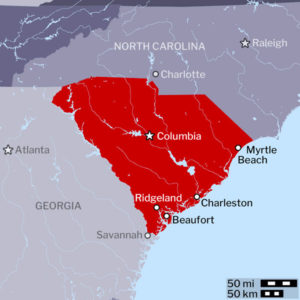 Jun 1: South Carolina Senate race: Candidates fight over who is the stronger segregationist. The South Carolina Democratic Party’s county-to-county campaign tour moves to Ridgeland in the morning and Beaufort in the afternoon. The campaign tour features debates and speeches by candidates for several public offices, but the big event at every stop is the showdown between Gov. Strom Thurmond and Sen. Olin D. Johnston, both of whom are fighting for Johnston’s Senate seat. According to the Associated Press, about a third of the crowd in Beaufort are African-Americans, who hear both men fight over who will best defend segregation. Thurmond reminds the crowd that he so opposed President Harry Truman’s civil rights policies that he broke away from the Democratic Party in 1948 to run as a “Dixiecrat” against Truman, carrying four Southern states in the process, including South Carolina. Johnston opposed Truman’s nomination at the convention, but supported him in November, and Johnston has defended staying in the Democratic Party throughout this year’s campaign. Johnston has been reminding crowds at every stop that he was part of the successful filibuster last month that defeated what was supposed be Truman’s signature civil rights legislation, the Fair Employment Practices Commission (FECP) bill. Thurmond scoffs, and says, “I fail to see how he can claim any support from the people of South Carolina for helping kill the pet measure of the man he helped elect on a platform calling for the civil rights program.”
Jun 1: South Carolina Senate race: Candidates fight over who is the stronger segregationist. The South Carolina Democratic Party’s county-to-county campaign tour moves to Ridgeland in the morning and Beaufort in the afternoon. The campaign tour features debates and speeches by candidates for several public offices, but the big event at every stop is the showdown between Gov. Strom Thurmond and Sen. Olin D. Johnston, both of whom are fighting for Johnston’s Senate seat. According to the Associated Press, about a third of the crowd in Beaufort are African-Americans, who hear both men fight over who will best defend segregation. Thurmond reminds the crowd that he so opposed President Harry Truman’s civil rights policies that he broke away from the Democratic Party in 1948 to run as a “Dixiecrat” against Truman, carrying four Southern states in the process, including South Carolina. Johnston opposed Truman’s nomination at the convention, but supported him in November, and Johnston has defended staying in the Democratic Party throughout this year’s campaign. Johnston has been reminding crowds at every stop that he was part of the successful filibuster last month that defeated what was supposed be Truman’s signature civil rights legislation, the Fair Employment Practices Commission (FECP) bill. Thurmond scoffs, and says, “I fail to see how he can claim any support from the people of South Carolina for helping kill the pet measure of the man he helped elect on a platform calling for the civil rights program.”![]()
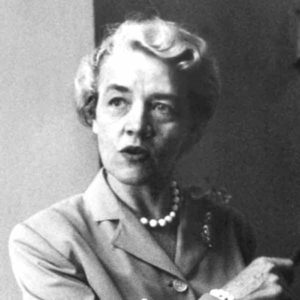 Jun 1: Seven Republican Senators repudiate McCarthy. The Senators, led by freshman Sen. Margaret Chase Smith of Maine, issue a “Declaration of Conscience,” in which they repudiating the tactics of their colleague, Sen. Joseph McCarthy (R-WI) and his campaign against the State Department. They begin by criticizing the Democratic Party for “its complacency to the threat of Communism.” But they quickly turn their attention to “certain elements of the Republican Party” who are “riding … to victory through the selfish political exploitation of fear, bigotry, ignorance and intolerance.” Sen. Smith reads the Declaration from the floor, with Sen. McCarthy sitting silently about three feet (1 m) behind her. After reading the declaration, Smith continues speaking Referring to Senatorial immunity from libel, she says: “It is ironical that we Senators can in debate in the Senate directly or indirectly impute to any American, who is not a Senator any conduct or motive unworthy or unbecoming an American — and without that non-Senator American having any legal redress against us. Yet if we say the same thing in the Senate about our colleagues, we can be stopped on the grounds of being out of order.” Reminding her colleagues that the Constitution guarantees “trial by jury instead of trial by accusation,” she says, “Those of us who shout the loudest about Americanism in making character assassinations are all too frequently those who … ignore some of the basic principles of Americanism: the right to criticize, the right to hold unpopular beliefs, the right to protest, the right to independent thought.” With this speech, Smith becomes the first Republican to openly criticize McCarthy’s tactics. Other Republican signers of the Declaration are Sens. Irving M. Ives (NY), Charles W. Tobey (NH), George D. Aiken (VT), Robert C. Hendrickson (NJ), Edward J. Thye (MN), and Wayne L. Morse (OR).
Jun 1: Seven Republican Senators repudiate McCarthy. The Senators, led by freshman Sen. Margaret Chase Smith of Maine, issue a “Declaration of Conscience,” in which they repudiating the tactics of their colleague, Sen. Joseph McCarthy (R-WI) and his campaign against the State Department. They begin by criticizing the Democratic Party for “its complacency to the threat of Communism.” But they quickly turn their attention to “certain elements of the Republican Party” who are “riding … to victory through the selfish political exploitation of fear, bigotry, ignorance and intolerance.” Sen. Smith reads the Declaration from the floor, with Sen. McCarthy sitting silently about three feet (1 m) behind her. After reading the declaration, Smith continues speaking Referring to Senatorial immunity from libel, she says: “It is ironical that we Senators can in debate in the Senate directly or indirectly impute to any American, who is not a Senator any conduct or motive unworthy or unbecoming an American — and without that non-Senator American having any legal redress against us. Yet if we say the same thing in the Senate about our colleagues, we can be stopped on the grounds of being out of order.” Reminding her colleagues that the Constitution guarantees “trial by jury instead of trial by accusation,” she says, “Those of us who shout the loudest about Americanism in making character assassinations are all too frequently those who … ignore some of the basic principles of Americanism: the right to criticize, the right to hold unpopular beliefs, the right to protest, the right to independent thought.” With this speech, Smith becomes the first Republican to openly criticize McCarthy’s tactics. Other Republican signers of the Declaration are Sens. Irving M. Ives (NY), Charles W. Tobey (NH), George D. Aiken (VT), Robert C. Hendrickson (NJ), Edward J. Thye (MN), and Wayne L. Morse (OR).
![]()
 Jun 1: Hawaiian volcano erupts. The Mauna Loa volcano on the big island of Hawaii erupts, with fissures opening at the summit and on the upper southwest face. The fissures spread quickly, sending lava flows to the west and southeast, and volcanic gas emissions up to 10,000 feet (3,050 m) above the summit. By shortly after midnight, the fast-moving lava flows travel thirteen miles (20 km) in only three hours, and reaches the southwest Kona coast. It severs the main highway and telephone lines, and destroying the villages of Pahoehoe and Ho’okena-mauka. When the lava reaches the ocean, it sends up a massive stem cloud that rises 10,000 feet (3,050 m). Fortunately, no lives are lost, but the volcano will continue to erupt for the next twenty-three days before going quiet.
Jun 1: Hawaiian volcano erupts. The Mauna Loa volcano on the big island of Hawaii erupts, with fissures opening at the summit and on the upper southwest face. The fissures spread quickly, sending lava flows to the west and southeast, and volcanic gas emissions up to 10,000 feet (3,050 m) above the summit. By shortly after midnight, the fast-moving lava flows travel thirteen miles (20 km) in only three hours, and reaches the southwest Kona coast. It severs the main highway and telephone lines, and destroying the villages of Pahoehoe and Ho’okena-mauka. When the lava reaches the ocean, it sends up a massive stem cloud that rises 10,000 feet (3,050 m). Fortunately, no lives are lost, but the volcano will continue to erupt for the next twenty-three days before going quiet.
▲Friday, June 2
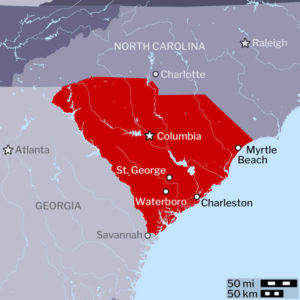 Jun 2: South Carolina Senate race: “I am not for races mixing because God did not mix them himself.” The South Carolina Democratic Party’s traditional county-to-county campaign tour goes to Waterboro and St. George, as Gov. Strom Thurmond and Sen. Olin Johnston battle for Johnston’s Senate seat. Both men turn their attention to Federal District Judge Waties Waring, the Charleston native who in 1948 declared unconstitutional the South Carolina Democratic Party’s ban on Negro membership and participation in the state Democratic primary, which is the only election that matters in the one-party state. Thurmond assails Johnston for not having “made one move” on Waring’s impeachment. Both men pile invectives on Judge Waring — Thurmond says Waring is a “low-down contemptible judge,” and Johnston calls him “Trumanistic,” perhaps the worst insult anyone in the South can deliver right now. But Johnston reminds Thurmond that the U.S. Constitution requires that impeachment proceedings begin in the House, not the Senate. If the House ever takes that step and approves articles of impeachment against Waring, Johnston declares he will “meet the resolution at the door of the Senate.” Thurmond turns to efforts at increasing federal spending on education, saying that the federal strings attached to South Carolina schools will “inevitably” break down segregation. “If the federal government will cut its expenses and leave more money in this state,” says Thurmond, “we can run our schools properly.” Both men can agree on one thing: They both oppose desegregation. Says Johnston, “I am not for races mixing because God did not mix them himself.” Thurmond says if segregation is ended, “there will be the greatest era of lawlessness and riots this country has ever known. The people of the South are not going to stand for it.” According to the Associated Press, about a third of the audience at Waterboro are African-Americans.
Jun 2: South Carolina Senate race: “I am not for races mixing because God did not mix them himself.” The South Carolina Democratic Party’s traditional county-to-county campaign tour goes to Waterboro and St. George, as Gov. Strom Thurmond and Sen. Olin Johnston battle for Johnston’s Senate seat. Both men turn their attention to Federal District Judge Waties Waring, the Charleston native who in 1948 declared unconstitutional the South Carolina Democratic Party’s ban on Negro membership and participation in the state Democratic primary, which is the only election that matters in the one-party state. Thurmond assails Johnston for not having “made one move” on Waring’s impeachment. Both men pile invectives on Judge Waring — Thurmond says Waring is a “low-down contemptible judge,” and Johnston calls him “Trumanistic,” perhaps the worst insult anyone in the South can deliver right now. But Johnston reminds Thurmond that the U.S. Constitution requires that impeachment proceedings begin in the House, not the Senate. If the House ever takes that step and approves articles of impeachment against Waring, Johnston declares he will “meet the resolution at the door of the Senate.” Thurmond turns to efforts at increasing federal spending on education, saying that the federal strings attached to South Carolina schools will “inevitably” break down segregation. “If the federal government will cut its expenses and leave more money in this state,” says Thurmond, “we can run our schools properly.” Both men can agree on one thing: They both oppose desegregation. Says Johnston, “I am not for races mixing because God did not mix them himself.” Thurmond says if segregation is ended, “there will be the greatest era of lawlessness and riots this country has ever known. The people of the South are not going to stand for it.” According to the Associated Press, about a third of the audience at Waterboro are African-Americans.▲Saturday, June 3
 Jun 3: Klan parades through Jacksonville, holds cross-burning ceremony. A motorcade of 78 automobiles bearing some 200 robed and hooded Klansmen move through downtown Jacksonville, Florida, and head out to a southern suburb for a cross-burning and rally. Earlier in the week, the city had denied a parade permit for Bill Hendrix of Tallahassee, who heads the Southern Knights of the Ku Klux Klan. The city also denied a permit for a gathering in downtown’s Hemming Park. But they couldn’t ban the motorcade as long as all of the traffic rules are observed. A few leaflets are thrown from some of the cars to spectators. Headed “Wake Up America,” the leaflets says that because of the Communist threat, “every white gentile Protestant American citizen needs to join the fight for pure Americanism.” The leaflets are signed, “The Association of Carolina Klans.” Hendrix’s Klan organization had joined an alliance with the Carolina Klans and another Alabama Klan group last February. On arriving at a point just south of the city limits, they burn a twenty-foot cross. An unseen speaker identified only as Emperor Nation II addresses the crowd from a heavily-guarded automobile. The announcer says that Hendrix and Thomas L. Hamilton of the Carolina Klans are both present. Hendrix vows that it will continue to conduct parades and cross-burnings “and tell the citizens what is going on despite the buck-passing of certain politicians.” He also announces a parade and rally at Orlando on July 8.
Jun 3: Klan parades through Jacksonville, holds cross-burning ceremony. A motorcade of 78 automobiles bearing some 200 robed and hooded Klansmen move through downtown Jacksonville, Florida, and head out to a southern suburb for a cross-burning and rally. Earlier in the week, the city had denied a parade permit for Bill Hendrix of Tallahassee, who heads the Southern Knights of the Ku Klux Klan. The city also denied a permit for a gathering in downtown’s Hemming Park. But they couldn’t ban the motorcade as long as all of the traffic rules are observed. A few leaflets are thrown from some of the cars to spectators. Headed “Wake Up America,” the leaflets says that because of the Communist threat, “every white gentile Protestant American citizen needs to join the fight for pure Americanism.” The leaflets are signed, “The Association of Carolina Klans.” Hendrix’s Klan organization had joined an alliance with the Carolina Klans and another Alabama Klan group last February. On arriving at a point just south of the city limits, they burn a twenty-foot cross. An unseen speaker identified only as Emperor Nation II addresses the crowd from a heavily-guarded automobile. The announcer says that Hendrix and Thomas L. Hamilton of the Carolina Klans are both present. Hendrix vows that it will continue to conduct parades and cross-burnings “and tell the citizens what is going on despite the buck-passing of certain politicians.” He also announces a parade and rally at Orlando on July 8.▲Sunday, June 4
![]() Jun 4: Belgian Flemish pro-Leopoldist part wins slim majority. Belgium’s Social Christian (Catholic) Party wins slim majorities in both houses of the Legislature in nationwide elections. The party gains a one-seat majority in the Chamber of Deputies, and a two-seat majority in the Senate for the seats directly elected by voters. Provincial councils will elect forty-six more more Senators in the 175-seat chamber, and the Senate itself will elect twenty-three as part of a complicated proportional-representation system. The Catholic party, which draws most of its strength from agricultural, poorer Dutch-speaking Flanders, has campaigned on a platform of bringing exiled King Leopold III back to the throne. The Socialists have campaigned against the King’s return, and gain strength at the expense of smaller parties in Brussels and the more prosperous industrial French-speaking Wallonia.
Jun 4: Belgian Flemish pro-Leopoldist part wins slim majority. Belgium’s Social Christian (Catholic) Party wins slim majorities in both houses of the Legislature in nationwide elections. The party gains a one-seat majority in the Chamber of Deputies, and a two-seat majority in the Senate for the seats directly elected by voters. Provincial councils will elect forty-six more more Senators in the 175-seat chamber, and the Senate itself will elect twenty-three as part of a complicated proportional-representation system. The Catholic party, which draws most of its strength from agricultural, poorer Dutch-speaking Flanders, has campaigned on a platform of bringing exiled King Leopold III back to the throne. The Socialists have campaigned against the King’s return, and gain strength at the expense of smaller parties in Brussels and the more prosperous industrial French-speaking Wallonia.
▲Monday, June 5
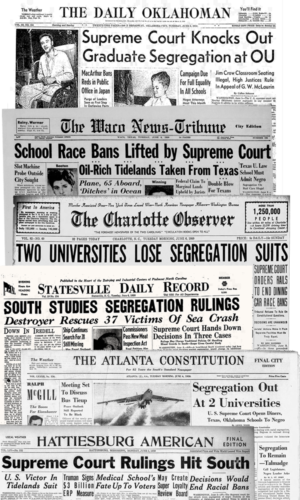 Jun 5: U.S. Supreme Court draws tight line around “Separate but Equal.” The U.S. Supreme Court rules unanimously in two separate cases that the doctrine of “separate but equal” is invalid unless a state is able to demonstrate that it provides truly equal opportunities for each race. One case involves the University of Texas, where the state hastily cobbled together a black law school, with fewer teachers and less resources, when an African-American student tried to enroll at UT. Another case involves the University of Oklahoma, which forces an African-American student to eat alone at a special “Negro” table at lunch and provides special “Negro” seating for him in the classroom and the library. The Court rules that public institutions of higher learning cannot treat students differently on account of race without depriving them of their Fourteenth Amendment rights of Equal Protection. In these decisions, the Court very carefully avoids affirming the “separate but equal” test itself. But it also refuses to reverse the 1896 doctrine established in Plessy v. Ferguson. Instead, it draws a tight line around the doctrine with this clear message: if the separate facilities aren’t truly equal, then they’re unconstitutional. Southern politicians are now in a panic. One Southern politician estimates that it will cost a billion dollars to bring black schools up to parity with white schools. That alone is an admission that “separate but equal” has always been a farce. Says Sen. Olin Johnston (D-SC), “It’s obvious that South Carolina cannot afford to provide separate and equal school facilities for both races. It’s also obvious that South Carolina isn’t ready to integrate the races in schools and colleges.” Georgia Gov. Herman Talmadge, who is locked in a bitter battle to claim the all-important Democratic nomination for re-election, seizes the rulings as a campaign issue. “As long as I am your Governor, Negroes will not be admitted to white schools,” he declares. But Thurgood Marshall, special counsel for the NAACP who represented Herman Marion Sweatt in the Texas case, points out that the separate-but-equal doctrine’s “effectiveness in graduate and professional education has been destroyed. Segregation no longer has the stamp of legality in any public education.” These two cases will become key building blocks for the historic 1954 case, Brown v. Board of Education, which will declare segregated public schools unconstitutional.
Jun 5: U.S. Supreme Court draws tight line around “Separate but Equal.” The U.S. Supreme Court rules unanimously in two separate cases that the doctrine of “separate but equal” is invalid unless a state is able to demonstrate that it provides truly equal opportunities for each race. One case involves the University of Texas, where the state hastily cobbled together a black law school, with fewer teachers and less resources, when an African-American student tried to enroll at UT. Another case involves the University of Oklahoma, which forces an African-American student to eat alone at a special “Negro” table at lunch and provides special “Negro” seating for him in the classroom and the library. The Court rules that public institutions of higher learning cannot treat students differently on account of race without depriving them of their Fourteenth Amendment rights of Equal Protection. In these decisions, the Court very carefully avoids affirming the “separate but equal” test itself. But it also refuses to reverse the 1896 doctrine established in Plessy v. Ferguson. Instead, it draws a tight line around the doctrine with this clear message: if the separate facilities aren’t truly equal, then they’re unconstitutional. Southern politicians are now in a panic. One Southern politician estimates that it will cost a billion dollars to bring black schools up to parity with white schools. That alone is an admission that “separate but equal” has always been a farce. Says Sen. Olin Johnston (D-SC), “It’s obvious that South Carolina cannot afford to provide separate and equal school facilities for both races. It’s also obvious that South Carolina isn’t ready to integrate the races in schools and colleges.” Georgia Gov. Herman Talmadge, who is locked in a bitter battle to claim the all-important Democratic nomination for re-election, seizes the rulings as a campaign issue. “As long as I am your Governor, Negroes will not be admitted to white schools,” he declares. But Thurgood Marshall, special counsel for the NAACP who represented Herman Marion Sweatt in the Texas case, points out that the separate-but-equal doctrine’s “effectiveness in graduate and professional education has been destroyed. Segregation no longer has the stamp of legality in any public education.” These two cases will become key building blocks for the historic 1954 case, Brown v. Board of Education, which will declare segregated public schools unconstitutional.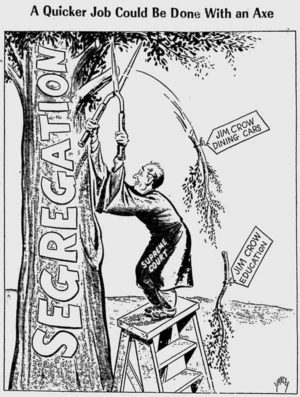 Jun 5: Supreme Court bans segregated interstate railroad dining cars. In a third case challenging segregation, U.S. Supreme Court rules unanimously that segregated railroad dining cars on interstate lines violate the Interstate Commerce Act. NAACP special counsel Thurgood Marshall says that this decision, when coupled with the two higher education decisions issued by the Court on the same day, means that “the complete destruction of all enforced segregation is now in sight.”
Jun 5: Supreme Court bans segregated interstate railroad dining cars. In a third case challenging segregation, U.S. Supreme Court rules unanimously that segregated railroad dining cars on interstate lines violate the Interstate Commerce Act. NAACP special counsel Thurgood Marshall says that this decision, when coupled with the two higher education decisions issued by the Court on the same day, means that “the complete destruction of all enforced segregation is now in sight.”
 Jun 5: Supreme Court refuses to weigh in on segregated private housing. Also today, the U.S. Supreme Court refuses to refuses to hear an appeal in a legal fight to allow Negroes to rent apartments in New York City’s Stuyvesant Town project in the Lower East Side. U.S. veterans returning home from World War II found that housing for their families is practically non-existent. War shortages and the pre-war Great Depression has left the country with more than a decade’s worth of unbuilt homes. The Stuyvesant Town project, built, owned and managed by Metropolitan Life Insurance Co., includes 8,759 critically-needed apartments, all of them built on city-supplied land and partially financed by generous tax breaks, and all of them barred to black tenants. Three Negro war veterans, Joseph Dorsey, Monroe Dowling, and Calvin Harper sued. When their case reached the New York Court of Appeals last July, the court ruled against them 4-3. In their briefs to the U.S. Supreme Court, their lawyers said that “Urban redevelopment laws are bing corrupted to remove unwanted minorities from building sites and to keep them out of newly built neighborhoods. The device of ‘cooperation’ between state and private enterprise becomes ‘cooperation’ to exclude Negroes.” Paul Ross, a white tenant and chairman of the Town and Village Tenants’ Committee to End Discrimination in Stuyvesant Town, says that this setback “does not end the fight against discrimination in Stuyvesant Town.” One internal survey shows that two-thirds of the tenants support integration. The following day, Ross and twenty-nine other tenants publicly associated with the desegregation effort will receive notices that their leases will not be renewed in September.
Jun 5: Supreme Court refuses to weigh in on segregated private housing. Also today, the U.S. Supreme Court refuses to refuses to hear an appeal in a legal fight to allow Negroes to rent apartments in New York City’s Stuyvesant Town project in the Lower East Side. U.S. veterans returning home from World War II found that housing for their families is practically non-existent. War shortages and the pre-war Great Depression has left the country with more than a decade’s worth of unbuilt homes. The Stuyvesant Town project, built, owned and managed by Metropolitan Life Insurance Co., includes 8,759 critically-needed apartments, all of them built on city-supplied land and partially financed by generous tax breaks, and all of them barred to black tenants. Three Negro war veterans, Joseph Dorsey, Monroe Dowling, and Calvin Harper sued. When their case reached the New York Court of Appeals last July, the court ruled against them 4-3. In their briefs to the U.S. Supreme Court, their lawyers said that “Urban redevelopment laws are bing corrupted to remove unwanted minorities from building sites and to keep them out of newly built neighborhoods. The device of ‘cooperation’ between state and private enterprise becomes ‘cooperation’ to exclude Negroes.” Paul Ross, a white tenant and chairman of the Town and Village Tenants’ Committee to End Discrimination in Stuyvesant Town, says that this setback “does not end the fight against discrimination in Stuyvesant Town.” One internal survey shows that two-thirds of the tenants support integration. The following day, Ross and twenty-nine other tenants publicly associated with the desegregation effort will receive notices that their leases will not be renewed in September.▲Tuesday, June 6
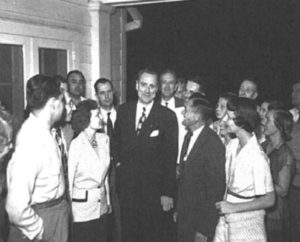 Jun 6: North Carolina Senate race: Supreme Court ruling prompts segregationist candidate to enter run-off (Jesse Helms enters politics). Alarmed by yesterday’s U.S. Supreme Court rulings that threaten segregation in public education and interstate transportation, a news manager of a Raleigh, North Carolina, radio station organizes an impromptu rally in front of the home of second-place Senatorial candidate Willis Smith. In last month’s Democratic primary, minor candidates denied Sen. Frank Graham an absolute majority, which means that Smith is entitled to a two-man run-off. He has until June 12 to make his decision, but he’s been quietly putting out hints that he may not ask for the rematch. WRAL radio news director (and future U.S. Senator) Jesse Helms broadcasts appeals to listeners to rally in front Willis’s home that evening. About 400 people show up and convince him to announce that he will issue the challenge. He will officially file the request the next day at noon. With the young Helms as his new adviser, Willis will launch one of the bitterest, most racially-charged campaigns North Carolinians have seen since the end of Reconstruction.
Jun 6: North Carolina Senate race: Supreme Court ruling prompts segregationist candidate to enter run-off (Jesse Helms enters politics). Alarmed by yesterday’s U.S. Supreme Court rulings that threaten segregation in public education and interstate transportation, a news manager of a Raleigh, North Carolina, radio station organizes an impromptu rally in front of the home of second-place Senatorial candidate Willis Smith. In last month’s Democratic primary, minor candidates denied Sen. Frank Graham an absolute majority, which means that Smith is entitled to a two-man run-off. He has until June 12 to make his decision, but he’s been quietly putting out hints that he may not ask for the rematch. WRAL radio news director (and future U.S. Senator) Jesse Helms broadcasts appeals to listeners to rally in front Willis’s home that evening. About 400 people show up and convince him to announce that he will issue the challenge. He will officially file the request the next day at noon. With the young Helms as his new adviser, Willis will launch one of the bitterest, most racially-charged campaigns North Carolinians have seen since the end of Reconstruction.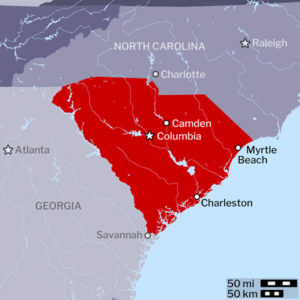 Jun 6: South Carolina Senate Race: Strom Thurmond warns that Supreme Court decisions are designed “to break down all forms of segregation.” Yesterday’s U.S. Supreme Court decisions dealing with “separate but equal” access to education in public colleges and universities becomes a big topic in the South Carolina Democratic primary race between Gov. Strom Thurmond and Sen. Olin Johnston, both of who are vying for Johnston’s U.S. Senate seat. They are in Camdon, participating in the Democratic Party’s county-to-county tour of speeches and debates leading up to the all-important Democratic primary on July 11 — the only election that matters in the one-party state. Thurmond, a foe of federal aid for education, seizes on the Court’s decision to paint himself as a stronger supporter of segregation. Thurmond says that the Court decisions “are designed ultimately to break down all forms of segregation in the South. What can we expect in our public schools if the Federal Government appropriates money for them? Nothing but integration of the races and regimentation of curricula, of teachers and pupils.” Johnston sees it differently. “The only thing we can do is take federal aid and equalize” Negro and white educational facilities “to offset” the court’s ruling. “If you don’t, you’ll probably have what you don’t want in South Carolina.”
Jun 6: South Carolina Senate Race: Strom Thurmond warns that Supreme Court decisions are designed “to break down all forms of segregation.” Yesterday’s U.S. Supreme Court decisions dealing with “separate but equal” access to education in public colleges and universities becomes a big topic in the South Carolina Democratic primary race between Gov. Strom Thurmond and Sen. Olin Johnston, both of who are vying for Johnston’s U.S. Senate seat. They are in Camdon, participating in the Democratic Party’s county-to-county tour of speeches and debates leading up to the all-important Democratic primary on July 11 — the only election that matters in the one-party state. Thurmond, a foe of federal aid for education, seizes on the Court’s decision to paint himself as a stronger supporter of segregation. Thurmond says that the Court decisions “are designed ultimately to break down all forms of segregation in the South. What can we expect in our public schools if the Federal Government appropriates money for them? Nothing but integration of the races and regimentation of curricula, of teachers and pupils.” Johnston sees it differently. “The only thing we can do is take federal aid and equalize” Negro and white educational facilities “to offset” the court’s ruling. “If you don’t, you’ll probably have what you don’t want in South Carolina.”![]()
 Jun 6: Overloaded plane carrying migrant workers from Puerto Rick crashes. A non-sheduled flight by Westair Transport and carrying three crew members and sixty-two Puerto Rican migrant farmworkers from San Juan to Wilmington, North Carolina, crashes into the Atlantic about 275 miles off the coast of Florida. Thirty-seven survivors are picked up by the destroyer Saufley about ten hours after the Curtis C-46 landed in the ocean. All three crew members survive. About half of the twenty-eight who died survived the water landing only to be killed by sharks, including one man who is attacked as he swims to the destroyer. He dies moments after being picked up out of the water. Pilot Joseph Halsey says that “none of the passengers understood English and so could not understand ditching instructions. Many sharks were in the vicinity of the life rafts.” The migrants were on their way to Michigan to harvest beets. Many of them continue their journey. The Civil Aeronautics Board (CAB) is trying to reign in non-scheduled airlines. The CAB says that most of these “non-skeds,” which are flying cheap surplus Air Force transport and cargo planes, don’t meet the safety, management, and financial standards that regulated scheduled airlines are required to follow. In this particular airliner, all of the seats have been removed and replaced with benches, and ropes are used in place of seat belts. Some of these airlines are competing directly with the major scheduled airlines by flying cut-rate routes on regular unpublished schedules, which directly violates their charters. The Civil Aeronautics Administration (CAA) says that Westair has “been guilty over a long period of time” of “careless and reckless operation of aircraft” and recommended that its operating certificate be revoked. The Civil Aeronautics Board (CAB) investigated the CAA complaint and added a new one, that the airline was operating over the Caribbean without proper authorization. Nevertheless, the airline still possesses its operating certificate. The CAB investigation will fail to reveal a probable cause for this accident. The out break of war in Korea later this month will create an urgent need for non-scheduled charter airlines like Westair, and outstanding actions against it will be quietly shelved. Westair will continue operations for another decade.
Jun 6: Overloaded plane carrying migrant workers from Puerto Rick crashes. A non-sheduled flight by Westair Transport and carrying three crew members and sixty-two Puerto Rican migrant farmworkers from San Juan to Wilmington, North Carolina, crashes into the Atlantic about 275 miles off the coast of Florida. Thirty-seven survivors are picked up by the destroyer Saufley about ten hours after the Curtis C-46 landed in the ocean. All three crew members survive. About half of the twenty-eight who died survived the water landing only to be killed by sharks, including one man who is attacked as he swims to the destroyer. He dies moments after being picked up out of the water. Pilot Joseph Halsey says that “none of the passengers understood English and so could not understand ditching instructions. Many sharks were in the vicinity of the life rafts.” The migrants were on their way to Michigan to harvest beets. Many of them continue their journey. The Civil Aeronautics Board (CAB) is trying to reign in non-scheduled airlines. The CAB says that most of these “non-skeds,” which are flying cheap surplus Air Force transport and cargo planes, don’t meet the safety, management, and financial standards that regulated scheduled airlines are required to follow. In this particular airliner, all of the seats have been removed and replaced with benches, and ropes are used in place of seat belts. Some of these airlines are competing directly with the major scheduled airlines by flying cut-rate routes on regular unpublished schedules, which directly violates their charters. The Civil Aeronautics Administration (CAA) says that Westair has “been guilty over a long period of time” of “careless and reckless operation of aircraft” and recommended that its operating certificate be revoked. The Civil Aeronautics Board (CAB) investigated the CAA complaint and added a new one, that the airline was operating over the Caribbean without proper authorization. Nevertheless, the airline still possesses its operating certificate. The CAB investigation will fail to reveal a probable cause for this accident. The out break of war in Korea later this month will create an urgent need for non-scheduled charter airlines like Westair, and outstanding actions against it will be quietly shelved. Westair will continue operations for another decade.
▲Wednesday, June 7
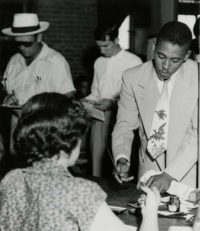 Jun 7: University of Texas enrolls first black student. Two days after the Supreme Court ruling requiring the University of Texas to enroll African-American students, John S. Chase enrolls at UT to study architecture. He becomes the first African-American to enroll at UT, which in turn, becomes the first major university in the South to enroll an African-American student. Horace L. Heath, dean of Paul Quinn College in Waco, also enrolls for UT’s summer session to begin work on his doctorate in government. Herman Marion Sweatt, whose lawsuit led to the Supreme Court decision striking the color barrier in Texas, will enroll in UT’s Law School in September. The faculty is generally supportive, but federal marshals will shadow the students for their own protection. Regents refuse admission to two other African-American applicants, citing “equal” programs available in their fields of study at two other black colleges in Texas. Chase will go on to become the first black architect licensed in Texas, the first black president of the UT alumni group, and the first black to serve on the U.S. Commission of Fine Arts.
Jun 7: University of Texas enrolls first black student. Two days after the Supreme Court ruling requiring the University of Texas to enroll African-American students, John S. Chase enrolls at UT to study architecture. He becomes the first African-American to enroll at UT, which in turn, becomes the first major university in the South to enroll an African-American student. Horace L. Heath, dean of Paul Quinn College in Waco, also enrolls for UT’s summer session to begin work on his doctorate in government. Herman Marion Sweatt, whose lawsuit led to the Supreme Court decision striking the color barrier in Texas, will enroll in UT’s Law School in September. The faculty is generally supportive, but federal marshals will shadow the students for their own protection. Regents refuse admission to two other African-American applicants, citing “equal” programs available in their fields of study at two other black colleges in Texas. Chase will go on to become the first black architect licensed in Texas, the first black president of the UT alumni group, and the first black to serve on the U.S. Commission of Fine Arts.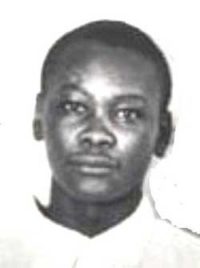 Jun 7: Alabama releases the last Scottsboro Boy still in prison. Andy Wright, the last of the Scottsboro Boys still in prison, is released by the Alabama Pardon and Parole board. Wright is one of nine African-Americans originally convicted of raping two white women aboard a freight train in Alabama in 1931. Wright, nineteen at the time, was sentenced to death with seven others, but the U.S. Supreme Court reversed their convictions for violations of due process. After six years of trials, Wright was finally convicted and sentenced to 99 years. He had been paroled in 1944 and fled North, against his parole conditions. He was lured back to Alabama with promises of leniency in 1947, but was returned to prison for allegedly reckless driving. After his release from the notorious Kilby Prison, Wright tells a reporter, “I’m not mad because the white girl lied about me. If she’s still living, I feel sorry for her because I don’t guess she sleeps much at night.” White, with his wife and child, will move to Albany, New York, to take a job as a hospital porter.
Jun 7: Alabama releases the last Scottsboro Boy still in prison. Andy Wright, the last of the Scottsboro Boys still in prison, is released by the Alabama Pardon and Parole board. Wright is one of nine African-Americans originally convicted of raping two white women aboard a freight train in Alabama in 1931. Wright, nineteen at the time, was sentenced to death with seven others, but the U.S. Supreme Court reversed their convictions for violations of due process. After six years of trials, Wright was finally convicted and sentenced to 99 years. He had been paroled in 1944 and fled North, against his parole conditions. He was lured back to Alabama with promises of leniency in 1947, but was returned to prison for allegedly reckless driving. After his release from the notorious Kilby Prison, Wright tells a reporter, “I’m not mad because the white girl lied about me. If she’s still living, I feel sorry for her because I don’t guess she sleeps much at night.” White, with his wife and child, will move to Albany, New York, to take a job as a hospital porter.![]() Jun 7: Ten anti-fascist committee members begin prison terms. Dr. Edward K. Barsky, novelist Howard Fast, and nine other members of the Joint Anti-Fascist Refugee Committee begin serving their sentences for contempt of Congress. The eleven were convicted more than three years ago for refusing to give organizational records to the House Committee on Un-American Activities. The committee was founded in 1941 to provide aid to Spanish Republican Loyalist refugees from Spain’s fascist regime under Gen. Francisco Franco. Committee supporters included Catholic social worker Dorothy Parker, Leonard Bernstein, Albert Einstein, Lillian Hellman, Rita Hayworth, Langston Hughes, Thomas Mann, Paul Robeson, Dalton Trumbo, and Orson Welles. But by 1946, as President Truman began tilting U.S. policy toward Franco to enlist his support in the Cold War, the Committee’s vigorous anti-Franco message came under fierce attacks from U.S. Attorney General Thomas C. Clark and his successor, J. Howard McGrath. They both have denounced the organization as a Communist-front after Clark placed it on the Justice Department’s list of subversive organizations. The eleven prisoners release a statement, saying that “the meaning of our imprisonment can be found only in the United States attempt for purposes of war, to shore up the tottering structure of fascism in Spain.” Barsky is sentenced to six months in jail and fined $500 (about $5,400 today). The rest were sentenced to three months in jail with a similar fine. Charges against two others are still working their way through the courts. In April 1951, the U.S. Supreme Court will find the Attorney General’s action “patently arbitrary.” That decision will have little practical effect, and the Joint Anti-Fascist Refugee Committee will disband n 1955.
Jun 7: Ten anti-fascist committee members begin prison terms. Dr. Edward K. Barsky, novelist Howard Fast, and nine other members of the Joint Anti-Fascist Refugee Committee begin serving their sentences for contempt of Congress. The eleven were convicted more than three years ago for refusing to give organizational records to the House Committee on Un-American Activities. The committee was founded in 1941 to provide aid to Spanish Republican Loyalist refugees from Spain’s fascist regime under Gen. Francisco Franco. Committee supporters included Catholic social worker Dorothy Parker, Leonard Bernstein, Albert Einstein, Lillian Hellman, Rita Hayworth, Langston Hughes, Thomas Mann, Paul Robeson, Dalton Trumbo, and Orson Welles. But by 1946, as President Truman began tilting U.S. policy toward Franco to enlist his support in the Cold War, the Committee’s vigorous anti-Franco message came under fierce attacks from U.S. Attorney General Thomas C. Clark and his successor, J. Howard McGrath. They both have denounced the organization as a Communist-front after Clark placed it on the Justice Department’s list of subversive organizations. The eleven prisoners release a statement, saying that “the meaning of our imprisonment can be found only in the United States attempt for purposes of war, to shore up the tottering structure of fascism in Spain.” Barsky is sentenced to six months in jail and fined $500 (about $5,400 today). The rest were sentenced to three months in jail with a similar fine. Charges against two others are still working their way through the courts. In April 1951, the U.S. Supreme Court will find the Attorney General’s action “patently arbitrary.” That decision will have little practical effect, and the Joint Anti-Fascist Refugee Committee will disband n 1955.
▲Thursday, June 8
 Jun 8: South Carolina Senate race: Any enemy of segregation “is no true Democrat, he is no true friend of the South, he is no true friend to South Carolina.” The South Carolina Democratic Party’s county-by-county “speakings” tour makes two stops today, at Chester in the morning and York in the afternoon. The highlight at every stop has been speeches and short debates between Gov. Strom Thurmond and Sen. Olin Johnston, both of whom are vying for Johnston’s U.S. Senate seat. Segregation — or “states rights” — has been one of many themes in the campaign, and Thurmond takes an especially nasty turn of it at York. Through much of the tour, Thurmond has criticized what he calls Johnston’s “pardon racket” from when Johnston was governor from 1935 to 1939 and from 1943 to 1945. While in Chester, Thurmond denounces Johnston for paroling “a Negro murderer,” who, according to Thurmond, “attacked a White couple on a Chester road. The man was a 22-year-old veteran” who “fought bravely to allow his companion to escape attack, but his life was stomped out by the murderous feet of Dave Dunham. Dave Dunham was the instrument of death but in reality it was the pardon racket which ended the life of this young Chester County veteran.” He then holds up a picture of U.S. Attorney General J. Howard McGrath, who in April urged the U.S. Supreme Court to end the 54-year-old “separate but equal” doctrine that allowed segregated colleges, universities and interstate railroads. The photo shows McGrath and Johnston, who Thurmond declares was “drinking a toast to celebrate” McGrath’s confirmation in the Senate. “Any man who would drink a toast to J. Howard McGrath, an enemy of the South who would break down segregation, is no true Democrat, he is no true friend of the South, he is no true friend to South Carolina.”
Jun 8: South Carolina Senate race: Any enemy of segregation “is no true Democrat, he is no true friend of the South, he is no true friend to South Carolina.” The South Carolina Democratic Party’s county-by-county “speakings” tour makes two stops today, at Chester in the morning and York in the afternoon. The highlight at every stop has been speeches and short debates between Gov. Strom Thurmond and Sen. Olin Johnston, both of whom are vying for Johnston’s U.S. Senate seat. Segregation — or “states rights” — has been one of many themes in the campaign, and Thurmond takes an especially nasty turn of it at York. Through much of the tour, Thurmond has criticized what he calls Johnston’s “pardon racket” from when Johnston was governor from 1935 to 1939 and from 1943 to 1945. While in Chester, Thurmond denounces Johnston for paroling “a Negro murderer,” who, according to Thurmond, “attacked a White couple on a Chester road. The man was a 22-year-old veteran” who “fought bravely to allow his companion to escape attack, but his life was stomped out by the murderous feet of Dave Dunham. Dave Dunham was the instrument of death but in reality it was the pardon racket which ended the life of this young Chester County veteran.” He then holds up a picture of U.S. Attorney General J. Howard McGrath, who in April urged the U.S. Supreme Court to end the 54-year-old “separate but equal” doctrine that allowed segregated colleges, universities and interstate railroads. The photo shows McGrath and Johnston, who Thurmond declares was “drinking a toast to celebrate” McGrath’s confirmation in the Senate. “Any man who would drink a toast to J. Howard McGrath, an enemy of the South who would break down segregation, is no true Democrat, he is no true friend of the South, he is no true friend to South Carolina.”![]()
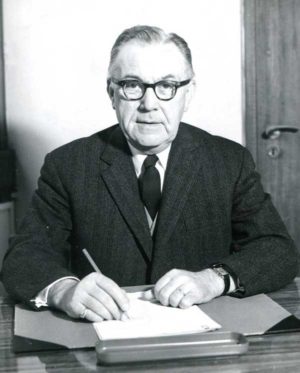 Jun 8: Belgium gets a new Prime Minister. Belgium finally gets a new government when Prime Minister Jean Duvieusart of the Social Christian (Catholic) Party is sworn in. The party campaigned on returning exiled King Leopold III to the throne by repealing a 1945 law that declared him “unable to reign” due to his controversial wartime activities. Because the Catholic Party draws most of its strength from Flanders, Duvieusart, a Walloon, is chosen to lead the government in the hopes that he might encounter less hostility in the anti-Leopoldist Walloon provinces. The Parliament will meet next month after the Senate’s composition is finalized.
Jun 8: Belgium gets a new Prime Minister. Belgium finally gets a new government when Prime Minister Jean Duvieusart of the Social Christian (Catholic) Party is sworn in. The party campaigned on returning exiled King Leopold III to the throne by repealing a 1945 law that declared him “unable to reign” due to his controversial wartime activities. Because the Catholic Party draws most of its strength from Flanders, Duvieusart, a Walloon, is chosen to lead the government in the hopes that he might encounter less hostility in the anti-Leopoldist Walloon provinces. The Parliament will meet next month after the Senate’s composition is finalized.
![]()
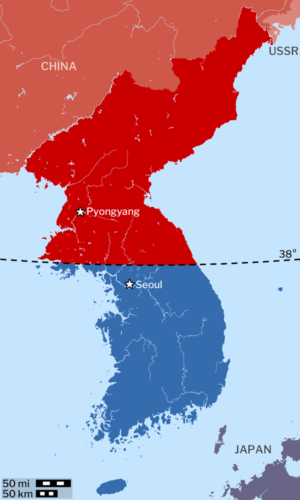 Jun 8: North Korea calls for reunification by August 15. Pyongyang newspapers publish a manifesto adopted by North Korea’s Central Committee of the United Democratic Patriotic Front. The manifesto proclaims: “On the fifth anniversary of the libration of Korea (from Japan), the people of South and North Korea can and should mark this day by celebrating it in the folds of one united democratic state.” Liberation Day, a holiday in both the North and South, is celebrated on August 15. The Front calls for elections to be held between August 3 and 8 to elect a united Supreme Parliament. The manifesto appears to pre-suppose that the entire Korean peninsula is under North Korean control in just a few short weeks. The manifesto is also broadcast over Pyongyang radio and will appear in the Soviet Union’s official newspaper Izvestia two days later.
Jun 8: North Korea calls for reunification by August 15. Pyongyang newspapers publish a manifesto adopted by North Korea’s Central Committee of the United Democratic Patriotic Front. The manifesto proclaims: “On the fifth anniversary of the libration of Korea (from Japan), the people of South and North Korea can and should mark this day by celebrating it in the folds of one united democratic state.” Liberation Day, a holiday in both the North and South, is celebrated on August 15. The Front calls for elections to be held between August 3 and 8 to elect a united Supreme Parliament. The manifesto appears to pre-suppose that the entire Korean peninsula is under North Korean control in just a few short weeks. The manifesto is also broadcast over Pyongyang radio and will appear in the Soviet Union’s official newspaper Izvestia two days later.
▲Friday, June 9
![]()
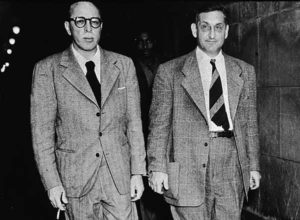 Jun 9: First two of Hollywood Ten begin jail sentences. Hollywood writers John Howard Lawson (Blockade, Algiers, Sahara), and Dalton Trumbo (Thirty Seconds Over Tokyo) begin serving one-year jail sentences for contempt of Congress. The two are part of the “Hollywood Ten,” all of whom were similarly charged after refusing to answer whether they were Communists before the U.S. House Committee on Un-American Activities in 1947. All ten appealed their convictions to the U.S. Supreme Court on First Amendment grounds. The Court refused to consider their case in April.
Jun 9: First two of Hollywood Ten begin jail sentences. Hollywood writers John Howard Lawson (Blockade, Algiers, Sahara), and Dalton Trumbo (Thirty Seconds Over Tokyo) begin serving one-year jail sentences for contempt of Congress. The two are part of the “Hollywood Ten,” all of whom were similarly charged after refusing to answer whether they were Communists before the U.S. House Committee on Un-American Activities in 1947. All ten appealed their convictions to the U.S. Supreme Court on First Amendment grounds. The Court refused to consider their case in April.
▲Saturday, June 10
▲Sunday, June 11
▲Monday, June 12
![]()
 Jun 12: Air France plane crashes at Bahrain, kills 46. An Air France DC-4 Skymaster, the Ciel de Picardie, on a scheduled flight from Saigon to Paris, crashes in the Persian Gulf while attempting to land for a scheduled stop in Bahrain. The aircraft is completing its Karachi to Bahrain leg when it overflies the airfield at about 9:00 p.m. and turns to make another approach. Other pilots in the area report a storm that had come up in the gulf as the Skymaster is making a second landing attempt. It crashes in the water about 3⅓ miles (5⅓ km) from the end of the runway. Forty-six of the fifty-two occupants on board are killed. All except one passenger on board are French. Bahrain, a British protectorate, has been an Air France stopover for only a few months. An investigation will pin the crash on pilot error, with fatigue being a possible factor.
Jun 12: Air France plane crashes at Bahrain, kills 46. An Air France DC-4 Skymaster, the Ciel de Picardie, on a scheduled flight from Saigon to Paris, crashes in the Persian Gulf while attempting to land for a scheduled stop in Bahrain. The aircraft is completing its Karachi to Bahrain leg when it overflies the airfield at about 9:00 p.m. and turns to make another approach. Other pilots in the area report a storm that had come up in the gulf as the Skymaster is making a second landing attempt. It crashes in the water about 3⅓ miles (5⅓ km) from the end of the runway. Forty-six of the fifty-two occupants on board are killed. All except one passenger on board are French. Bahrain, a British protectorate, has been an Air France stopover for only a few months. An investigation will pin the crash on pilot error, with fatigue being a possible factor.
▲Tuesday, June 13
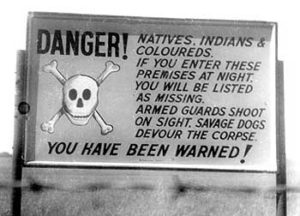 Jun 13: South Africa enacts second key apartheid legislation. South Africa enacts the Group Areas Act, which divides urban areas into racially segregated zones where members of a specific race are allowed to live and work. Each group area is designated for the exclusive occupation and ownership of a designated race or ethnic group, and it becomes a criminal offense to reside or own property in an area set aside for another race or ethnic group. The South African House of Assembly approves the bill, 78 to 58. Prime Minister D.F. Malan says that in the face of non-white demands for equality, “the one great thing that remains is the maintenance of the white race and of white civilizations.” Lands Minister J.G. Strydom says that only by this law “could the country be saved from a blood bath. … Only segregation can prevent the bastardization of the white race.” This law builds on the Population Registration Act that was passed in May. That law requires every individual to be classified according to race and ethnic group, with that classification recorded in the national population register along with the individual’s identity number. Black Africans, furthermore, are required to give their place of residence, and if they move they are required to notify authorities so the population register can be updated. Everyone over the age of sixteen will be issued identity cards, and police and other officials will be authorized to demand anyone sixteen or older to produce their identity card. Both laws will go into effect simultaneously on July 7.
Jun 13: South Africa enacts second key apartheid legislation. South Africa enacts the Group Areas Act, which divides urban areas into racially segregated zones where members of a specific race are allowed to live and work. Each group area is designated for the exclusive occupation and ownership of a designated race or ethnic group, and it becomes a criminal offense to reside or own property in an area set aside for another race or ethnic group. The South African House of Assembly approves the bill, 78 to 58. Prime Minister D.F. Malan says that in the face of non-white demands for equality, “the one great thing that remains is the maintenance of the white race and of white civilizations.” Lands Minister J.G. Strydom says that only by this law “could the country be saved from a blood bath. … Only segregation can prevent the bastardization of the white race.” This law builds on the Population Registration Act that was passed in May. That law requires every individual to be classified according to race and ethnic group, with that classification recorded in the national population register along with the individual’s identity number. Black Africans, furthermore, are required to give their place of residence, and if they move they are required to notify authorities so the population register can be updated. Everyone over the age of sixteen will be issued identity cards, and police and other officials will be authorized to demand anyone sixteen or older to produce their identity card. Both laws will go into effect simultaneously on July 7.▲Wednesday, June 14
Flag Day (US)
 Jun 14: South Africa gives second reading to “Suppression of Communism” bill. Over the past month, South Africa’s House of Assembly passed two pieces of apartheid legislation. The first bill in May established a rigid system of racial and ethnic classification and registration. The second one passed just yesterday, the Group Areas Act, will use that classification system to set aside strictly-segregated zones that will force mixed-race families and friends apart and impose severe restrictions on where people can own property, live, and work. Now the Assembly turns its attention to the third important piece of apartheid legislation. This bill was originally named the Unlawful Organizations Bill, which raised a few eyebrows among opposition parties in Parliament. Justice Minister Charles Swart sought to calm fears by reassuring Parliament that it was only intended to regulate “Communism.” He agreed to change the bill’s title to the Suppression of Communism Bill, but he didn’t bother to change the bill’s text, which contains an unusually broad definition of “communism.” Among its definitions is one that defines Communism to include “any doctrine or scheme … which aims at the encouragement of feelings of hostility between European and non-European races of the Union.” Swart reinforces that definition in a speech to Parliament: “Among the non-European population Communism is taking another form, a form which is spreading like wild fire not only through South Africa but through the whole of Africa. That form of Communism is Nationalism; not Nationalism as we know it, but Bantu or Negro Nationalism. That so-called Bantu Nationalism is the wooden horse in which Communism is hiding in order to enter the gates of South Africa.” Swart claims that natives are being placed in key positions in food depots, water reservoirs and power stations. “At a given sign, they will act,” he says. “Water would be poisoned, food destroyed and electric power cut off. Other natives would murder whites whom the Communists considered stood in their way.” Swart says that the Communists wants to disturb “the old friendly relations which had existed for years between whites and non-whites and between the white employer and non-white worker.” The Assembly gives its approval for the bill’s second reading. Meanwhile, outside the Parliament building in Capetown, police armed with clubs charge into demonstrating crowds. Some members of Parliament watch as protesters are beaten.
Jun 14: South Africa gives second reading to “Suppression of Communism” bill. Over the past month, South Africa’s House of Assembly passed two pieces of apartheid legislation. The first bill in May established a rigid system of racial and ethnic classification and registration. The second one passed just yesterday, the Group Areas Act, will use that classification system to set aside strictly-segregated zones that will force mixed-race families and friends apart and impose severe restrictions on where people can own property, live, and work. Now the Assembly turns its attention to the third important piece of apartheid legislation. This bill was originally named the Unlawful Organizations Bill, which raised a few eyebrows among opposition parties in Parliament. Justice Minister Charles Swart sought to calm fears by reassuring Parliament that it was only intended to regulate “Communism.” He agreed to change the bill’s title to the Suppression of Communism Bill, but he didn’t bother to change the bill’s text, which contains an unusually broad definition of “communism.” Among its definitions is one that defines Communism to include “any doctrine or scheme … which aims at the encouragement of feelings of hostility between European and non-European races of the Union.” Swart reinforces that definition in a speech to Parliament: “Among the non-European population Communism is taking another form, a form which is spreading like wild fire not only through South Africa but through the whole of Africa. That form of Communism is Nationalism; not Nationalism as we know it, but Bantu or Negro Nationalism. That so-called Bantu Nationalism is the wooden horse in which Communism is hiding in order to enter the gates of South Africa.” Swart claims that natives are being placed in key positions in food depots, water reservoirs and power stations. “At a given sign, they will act,” he says. “Water would be poisoned, food destroyed and electric power cut off. Other natives would murder whites whom the Communists considered stood in their way.” Swart says that the Communists wants to disturb “the old friendly relations which had existed for years between whites and non-whites and between the white employer and non-white worker.” The Assembly gives its approval for the bill’s second reading. Meanwhile, outside the Parliament building in Capetown, police armed with clubs charge into demonstrating crowds. Some members of Parliament watch as protesters are beaten.![]() Jun 14: Second Air France flight crashes at Bahrain. A second Air France DC-4 Skymaster, the Ciel de Gascogne, which is running the same route from Saigon to Paris as the one that crashed two days ago, crashes in the Persian Gulf while trying to land in Bahrain. Like Monday’s crash, there are storms over the gulf as the plane tries to land at about 10:00 p.m. for its regular stopover from Karachi. It crashes within a mile (1.6 km) of the first crash. Forty of the fifty-three occupants are killed. Most of those on board are French citizens, in addition to two Vietnamese and two Chinese. At least thirteen passengers are children. This second crash raises suspicions: two planes of the same type, flying the same route, crashing while landing at the same airport — could it be sabotage? Is it the work of Vietminh rebels, which is fighting against France’s colonial presence in Vietnam? Despite the extraordinary coincidences, investigator will find no evidence of foul play. They will eventually blame pilot error for the crash. In 1994, both crashes will be reinvestigated and attributed to extreme weather conditions that we now know of as microbursts, a phenomenon that is unknown in 1950. The investigators will recommend that both pilots be exonerated due to conditions that were unknown at the time and were beyond their training or capability to respond to.
Jun 14: Second Air France flight crashes at Bahrain. A second Air France DC-4 Skymaster, the Ciel de Gascogne, which is running the same route from Saigon to Paris as the one that crashed two days ago, crashes in the Persian Gulf while trying to land in Bahrain. Like Monday’s crash, there are storms over the gulf as the plane tries to land at about 10:00 p.m. for its regular stopover from Karachi. It crashes within a mile (1.6 km) of the first crash. Forty of the fifty-three occupants are killed. Most of those on board are French citizens, in addition to two Vietnamese and two Chinese. At least thirteen passengers are children. This second crash raises suspicions: two planes of the same type, flying the same route, crashing while landing at the same airport — could it be sabotage? Is it the work of Vietminh rebels, which is fighting against France’s colonial presence in Vietnam? Despite the extraordinary coincidences, investigator will find no evidence of foul play. They will eventually blame pilot error for the crash. In 1994, both crashes will be reinvestigated and attributed to extreme weather conditions that we now know of as microbursts, a phenomenon that is unknown in 1950. The investigators will recommend that both pilots be exonerated due to conditions that were unknown at the time and were beyond their training or capability to respond to.
▲Thursday, June 15
▲Friday, June 16
![]()
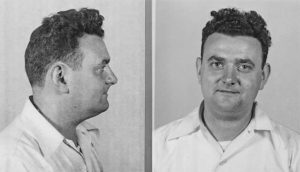 Jun 16: David Greenglass arrested for espionage. The former technician at the Oak Ridge and Los Alamos nuclear facilities is accused of giving highly sensitive atomic secrets to Harry Gold, who in turned sent them on to the Soviet Union via convicted spy Klaus Fuchs. Because the acts allegedly took place during wartime, Greenglass will face the electric chair if convicted. To avoid the chair, Greenglass will implicate his own sister and her husband, Ethel and Julius Rosenberg.
Jun 16: David Greenglass arrested for espionage. The former technician at the Oak Ridge and Los Alamos nuclear facilities is accused of giving highly sensitive atomic secrets to Harry Gold, who in turned sent them on to the Soviet Union via convicted spy Klaus Fuchs. Because the acts allegedly took place during wartime, Greenglass will face the electric chair if convicted. To avoid the chair, Greenglass will implicate his own sister and her husband, Ethel and Julius Rosenberg.
![]() Jun 16: Truman signs law allowing more than 400,000 refugees to enter the U.S. President Truman signs the Displaced Persons Bill into law, which allows 415,744 refugees from Europe to enter the United States. Truman praises the very broad bipartisan support given the bill as “a splendid example of the way in which joint action can strengthen and unify our country.” The bill raises the quota by about 180,000 people, and extends the deadline for issuing visas from June 30, 1950 to July 1, 1952. Officials believe the bill will result in the virtual emptying of the displaced persons camps in Europe. Conspicuously absent at the bill-signing ceremony is Sen. Pat McCarren (D-NV), Senate Judiciary Committee chairman and a McCarthy ally who was a vocal opponent of the bill.
Jun 16: Truman signs law allowing more than 400,000 refugees to enter the U.S. President Truman signs the Displaced Persons Bill into law, which allows 415,744 refugees from Europe to enter the United States. Truman praises the very broad bipartisan support given the bill as “a splendid example of the way in which joint action can strengthen and unify our country.” The bill raises the quota by about 180,000 people, and extends the deadline for issuing visas from June 30, 1950 to July 1, 1952. Officials believe the bill will result in the virtual emptying of the displaced persons camps in Europe. Conspicuously absent at the bill-signing ceremony is Sen. Pat McCarren (D-NV), Senate Judiciary Committee chairman and a McCarthy ally who was a vocal opponent of the bill.
![]() Jun 16: Labor leader’s U.S. citizenship revoked. Federal Judge George B. Harris revokes the U.S. citizenship of Australia-native Harry Bridges, head of the San Francisco-based International Longshoremen’s and Warehousemen’s Union. In April, Bridges was found guilty of perjury when he swore that he had never been a Communist Party member when he became a U.S. citizen in 1945. Bridges was sentenced to serve five years in prison for perjury and conspiracy to commit fraud when he obtained his citizenship, but he is currently out on bail pending appeal. This is the latest step in a long government effort to expel Bridges from the United States. It all began in 1934, when Bridges helped lead a bloody strike in which strikebreakers rammed a picket lines with trucks and San Francisco police shot up a union mess hall. Three years later Bridges organized the ILWU by encouraging union locals to leave the employer-friendly International Longshoreman’s Association, which was affiliated with the American Federation of Labor (AFL). Bridges aligned the ILWU with the more industry-focused Congress of Industrial Organizations (CIO), which companies saw as a greater threat than that posed by the more craft-focused AFL. Bridges survived two deportation efforts in 1939 and 1941 as a resident alien. In 1945, the U.S. Supreme Court halted the effort launched in 1941, calling the evidence that Bridges was a Communist “exceedingly tenuous.” Bridges became a citizen three months later. With today’s order revoking his citizenship, the government’s next step will be for the Immigration Service to begin deportation hearings. Bridges’s attorneys say they will appeal the judge’s order.
Jun 16: Labor leader’s U.S. citizenship revoked. Federal Judge George B. Harris revokes the U.S. citizenship of Australia-native Harry Bridges, head of the San Francisco-based International Longshoremen’s and Warehousemen’s Union. In April, Bridges was found guilty of perjury when he swore that he had never been a Communist Party member when he became a U.S. citizen in 1945. Bridges was sentenced to serve five years in prison for perjury and conspiracy to commit fraud when he obtained his citizenship, but he is currently out on bail pending appeal. This is the latest step in a long government effort to expel Bridges from the United States. It all began in 1934, when Bridges helped lead a bloody strike in which strikebreakers rammed a picket lines with trucks and San Francisco police shot up a union mess hall. Three years later Bridges organized the ILWU by encouraging union locals to leave the employer-friendly International Longshoreman’s Association, which was affiliated with the American Federation of Labor (AFL). Bridges aligned the ILWU with the more industry-focused Congress of Industrial Organizations (CIO), which companies saw as a greater threat than that posed by the more craft-focused AFL. Bridges survived two deportation efforts in 1939 and 1941 as a resident alien. In 1945, the U.S. Supreme Court halted the effort launched in 1941, calling the evidence that Bridges was a Communist “exceedingly tenuous.” Bridges became a citizen three months later. With today’s order revoking his citizenship, the government’s next step will be for the Immigration Service to begin deportation hearings. Bridges’s attorneys say they will appeal the judge’s order.
▲Saturday, June 17
![]()
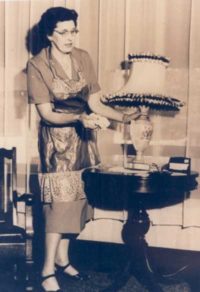 Jun 17: First human organ transplant in history performed. The first human organ transplant in history is performed at the Little Company of Mary Hospital in the Chicago suburb of Evergreen Park. Dr. Richard Lawler leads a surgical team that transplants a kidney from a woman who died an hour earlier of cirrhosis of the liver. Ruth Tucker, 44, of Jasper, Indiana, is the transplant recipient, and she will live another five years after the operation.
Jun 17: First human organ transplant in history performed. The first human organ transplant in history is performed at the Little Company of Mary Hospital in the Chicago suburb of Evergreen Park. Dr. Richard Lawler leads a surgical team that transplants a kidney from a woman who died an hour earlier of cirrhosis of the liver. Ruth Tucker, 44, of Jasper, Indiana, is the transplant recipient, and she will live another five years after the operation.
▲Sunday, June 18
Father’s Day (Canada, US)
▲Monday, June 19
Juneteenth/Emancipation Day (US)
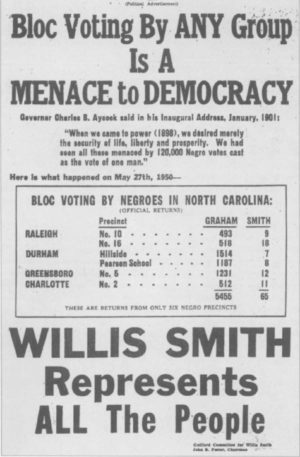 Jun 19: North Carolina Senate Race: “Bloc voting by Negroes” used to discredit Sen. Graham. In North Carolina, where Sen. Frank Graham is defending his Senate seat against Raleigh lawyer Willis Smith, the official campaign for the Democratic primary runoff has been surprisingly calm, especially considering how bitterly fought the first campaign had been. But last month’s primary vote gave Smith some new race-based ammunition to use against Graham, and Smith’s surrogates are taking the lead. State Sen. R.N. Simms, Jr., of Wake County, speaks on statewide radio and ties Graham’s near-win last month to the overwhelming support Graham received from African-American voters in precincts where they were able to register. Simms assails Graham’s supporters who “were determined to try to elect him by bloc-voting Negro citizens for the first time in fifty years. … That record of bloc voting must be the result of arousing of racial feeling on behalf of the candidates who benefitted by it. Surely, no thinking citizen of North Carolina can believe that anyone stirred it up except the candidate who profited by it at the polls.”
Jun 19: North Carolina Senate Race: “Bloc voting by Negroes” used to discredit Sen. Graham. In North Carolina, where Sen. Frank Graham is defending his Senate seat against Raleigh lawyer Willis Smith, the official campaign for the Democratic primary runoff has been surprisingly calm, especially considering how bitterly fought the first campaign had been. But last month’s primary vote gave Smith some new race-based ammunition to use against Graham, and Smith’s surrogates are taking the lead. State Sen. R.N. Simms, Jr., of Wake County, speaks on statewide radio and ties Graham’s near-win last month to the overwhelming support Graham received from African-American voters in precincts where they were able to register. Simms assails Graham’s supporters who “were determined to try to elect him by bloc-voting Negro citizens for the first time in fifty years. … That record of bloc voting must be the result of arousing of racial feeling on behalf of the candidates who benefitted by it. Surely, no thinking citizen of North Carolina can believe that anyone stirred it up except the candidate who profited by it at the polls.”![]() Jun 19: State Department special adviser visit’s 38th Parallel in Korea. John Foster Dulles, special adviser to Secretary of State Dean Acheson, visits the 38th Parallel in Korea, which serves as the boundary between North and South Korea. He then goes to Seoul to address the opening of the second freely elected National Assembly in South Korea’s short history.
Jun 19: State Department special adviser visit’s 38th Parallel in Korea. John Foster Dulles, special adviser to Secretary of State Dean Acheson, visits the 38th Parallel in Korea, which serves as the boundary between North and South Korea. He then goes to Seoul to address the opening of the second freely elected National Assembly in South Korea’s short history.
▲Tuesday, June 20
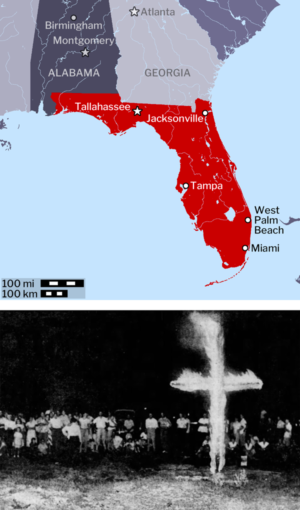 Jun 20: KKK burns cross at West Palm Beach. The cross-burning is part of a recruitment drive in southern Florida. J.D. Davis, a Klan organizer for the Association of Georgia Klansmen (they sometimes call themselves the Association of American Klansmen), says he was sent by the imperial wizard, Samuel Roper, to “set up as many Klans in Palm Beach county as you can.” The Atlanta-based organization is a rival to the Tallahassee-based Southern Knights of the Ku Klux Klan headed by Bill Hendrix. Davis tells an estimated 250 curious onlookers, “We ain’t out to hurt nobody. Why, the Wizard himself tells me, he says: ‘Davis, if anybody in your Klan down there hurts any niggers, why you just let me know. I’ll prosecute him to the fullest extent of the law. Yes, sir.” He also explains: “The burning of the cross is not to frighten niggers. It symbolizes what we believe in. It is emblematic of Christ. The Klan stands for white supremacy, no mixing of colors.”
Jun 20: KKK burns cross at West Palm Beach. The cross-burning is part of a recruitment drive in southern Florida. J.D. Davis, a Klan organizer for the Association of Georgia Klansmen (they sometimes call themselves the Association of American Klansmen), says he was sent by the imperial wizard, Samuel Roper, to “set up as many Klans in Palm Beach county as you can.” The Atlanta-based organization is a rival to the Tallahassee-based Southern Knights of the Ku Klux Klan headed by Bill Hendrix. Davis tells an estimated 250 curious onlookers, “We ain’t out to hurt nobody. Why, the Wizard himself tells me, he says: ‘Davis, if anybody in your Klan down there hurts any niggers, why you just let me know. I’ll prosecute him to the fullest extent of the law. Yes, sir.” He also explains: “The burning of the cross is not to frighten niggers. It symbolizes what we believe in. It is emblematic of Christ. The Klan stands for white supremacy, no mixing of colors.”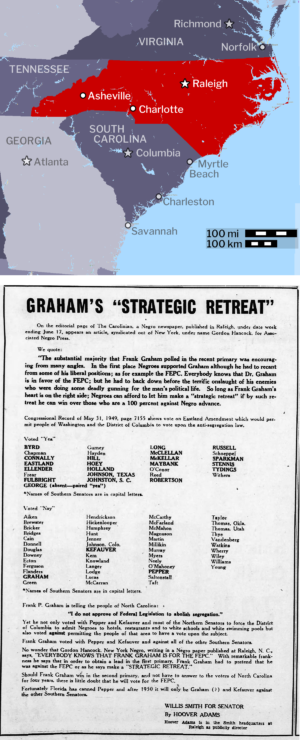 Jun 20: North Carolina Senate race: Segregationist accuses Sen. Graham of injecting race into politics. Willis Smith, a Raleigh, North Carolina, lawyer who is challenging Sen. Frank Graham in the Democratic primary run-off for Graham’s Senate seat, turns up the race-bating at a campaign appearance in Asheville. Smith reiterates his claim that Graham supports the Fair Employment Practices Commission (FEPC) bill, which, if passed, would mark a landmark achievement in President Truman’s civil program. “Dr Graham has refused to stand shoulder to shoulder with our great Senator Hoey (D-NC) in fighting this (FEPC) proposal,” says Smith, despite Graham’s repeated denials that he favors the FEPC. Smith also quotes from a Black syndicated columnist published in a North Carolina Negro newspaper, which said, “Everybody knows that Dr. Graham is in favor of the FEPC, but he had to back down before the terrific onslaught of his enemies who were doing some deadly gunning for the man’s political life. So long as Frank Graham’s heart is on the right side, Negroes can afford to let him make a ‘strategic retreat’ if by such retreat he can win over those who are a 100 per cent against Negro advance.” Smith declares that the lopsided vote against him in the first round of voting last month “is an example of bloc voting to a most iniquitous degree. I do no know what sort of deal the Graham supporters had with the Negro leaders of North Carolina, but it certainly seems that, whatever the understanding, the raising of the race issue by my opposition produced results for Dr. Graham.” Smith likens the Negro vote to “the way in the dictator nations. Oh, yes, the people in Germany and Russia voted, but they voted almost all one way as happened in a few precincts in North Carolina.” An ad for Smith featuring the quote from the New York columnist will appear in the Asheville Citizen two days later.
Jun 20: North Carolina Senate race: Segregationist accuses Sen. Graham of injecting race into politics. Willis Smith, a Raleigh, North Carolina, lawyer who is challenging Sen. Frank Graham in the Democratic primary run-off for Graham’s Senate seat, turns up the race-bating at a campaign appearance in Asheville. Smith reiterates his claim that Graham supports the Fair Employment Practices Commission (FEPC) bill, which, if passed, would mark a landmark achievement in President Truman’s civil program. “Dr Graham has refused to stand shoulder to shoulder with our great Senator Hoey (D-NC) in fighting this (FEPC) proposal,” says Smith, despite Graham’s repeated denials that he favors the FEPC. Smith also quotes from a Black syndicated columnist published in a North Carolina Negro newspaper, which said, “Everybody knows that Dr. Graham is in favor of the FEPC, but he had to back down before the terrific onslaught of his enemies who were doing some deadly gunning for the man’s political life. So long as Frank Graham’s heart is on the right side, Negroes can afford to let him make a ‘strategic retreat’ if by such retreat he can win over those who are a 100 per cent against Negro advance.” Smith declares that the lopsided vote against him in the first round of voting last month “is an example of bloc voting to a most iniquitous degree. I do no know what sort of deal the Graham supporters had with the Negro leaders of North Carolina, but it certainly seems that, whatever the understanding, the raising of the race issue by my opposition produced results for Dr. Graham.” Smith likens the Negro vote to “the way in the dictator nations. Oh, yes, the people in Germany and Russia voted, but they voted almost all one way as happened in a few precincts in North Carolina.” An ad for Smith featuring the quote from the New York columnist will appear in the Asheville Citizen two days later.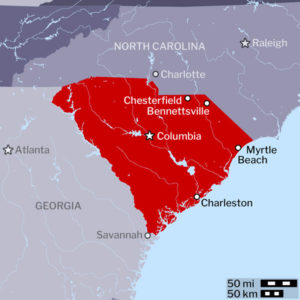 Jun 20: South CarolinaSenate race: “Who has ever fought harder for states rights … or against civil rights?”The South Carolina Democratic Party’s county-to-county “speakings” resume in Chesterfield and Bennettsville after a week and a half hiatus today. The speakings, a traditional feature of Democratic Party politics, brings political candidates to each of South Carolina’s forty-six county seats for speeches and brief debates in preparation for the Democratic primary, the only election that really matters in this one-party state. The headline event this year is the bitter contest between Gov. Strom Thurmond, who is challenging Sen. Olin Johnston for Johnston’s Senate seat. At Bennettsville this afternoon, Thurmond cites Johnston’s pro-labor record and says that Johnston is “the undisputed and unqualified candidate of the CIO (Congress of Industrial Organizations) Political Action Committee.” The CIO and the NAACP, says Thurmond, “are working hand in hand in this drive to end segregation in the South, and they are seeking to dominate this election … in behalf of my opponent by voting these minority blocks for him.” The CIO last month issued a directive banning racial segregation in union halls, meeting places, offices, and all other properties owned or leased by member labor unions. This includes all CIO-affiliated union facilities in the South. Johnston responds that he is and always have fought for racial segregation, most recently in helping to sustain a Senate filibuster against what would have been President Truman’s signature civil rights bill had it been enacted. “Who has ever fought harder for states rights … or against civil rights in the U.S. Senate?” he asks.
Jun 20: South CarolinaSenate race: “Who has ever fought harder for states rights … or against civil rights?”The South Carolina Democratic Party’s county-to-county “speakings” resume in Chesterfield and Bennettsville after a week and a half hiatus today. The speakings, a traditional feature of Democratic Party politics, brings political candidates to each of South Carolina’s forty-six county seats for speeches and brief debates in preparation for the Democratic primary, the only election that really matters in this one-party state. The headline event this year is the bitter contest between Gov. Strom Thurmond, who is challenging Sen. Olin Johnston for Johnston’s Senate seat. At Bennettsville this afternoon, Thurmond cites Johnston’s pro-labor record and says that Johnston is “the undisputed and unqualified candidate of the CIO (Congress of Industrial Organizations) Political Action Committee.” The CIO and the NAACP, says Thurmond, “are working hand in hand in this drive to end segregation in the South, and they are seeking to dominate this election … in behalf of my opponent by voting these minority blocks for him.” The CIO last month issued a directive banning racial segregation in union halls, meeting places, offices, and all other properties owned or leased by member labor unions. This includes all CIO-affiliated union facilities in the South. Johnston responds that he is and always have fought for racial segregation, most recently in helping to sustain a Senate filibuster against what would have been President Truman’s signature civil rights bill had it been enacted. “Who has ever fought harder for states rights … or against civil rights in the U.S. Senate?” he asks.![]()
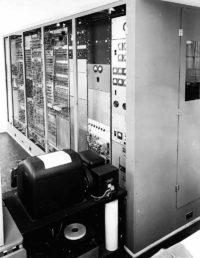 Jun 20: World’s fastest computer debuts. The National Bureau of Standards unveils the world’s fastest computer. The Standards Eastern (or Electronic) Automatic Computer (SEAC) costs $250,000 (about $2.7 million today), and is designed to be a small-scale computer that can be built and put into operation quickly and expanded upon over time while the NBS develops a more powerful computer. The SEAC initially uses only 747 vacuum tubes and 10,5000 germanium diodes to perform all of its logic functions. It is the first fully functional stored-program electronic computer in the U.S., with a storage capacity of 512 words of memory, with each word being 45 bits in size. The initial instruction set consists of eleven types of commands. The “super-speed” computer’s clock rate is 1 MHz, allowing it to perform 1,100 additions or subtractions per second and 330 multiplications or divisions per second. For programmers, SEAC pioneers the use of checksums and breakpoints as troubleshooting aids. The SEAC booted up for the first time in April and it became fully operational in May. By 1953, the NBS will consider SEAC’s 80% up-time “a gratifying performance for a pioneering installation.” Over its thirteen years of operation, the SEAC will calculate stresses in aircraft structures, devices sampling plans for the Census Bureau, implement accounting procedures for Social Security, and in 1957 it will produce the world’s first digital image.
Jun 20: World’s fastest computer debuts. The National Bureau of Standards unveils the world’s fastest computer. The Standards Eastern (or Electronic) Automatic Computer (SEAC) costs $250,000 (about $2.7 million today), and is designed to be a small-scale computer that can be built and put into operation quickly and expanded upon over time while the NBS develops a more powerful computer. The SEAC initially uses only 747 vacuum tubes and 10,5000 germanium diodes to perform all of its logic functions. It is the first fully functional stored-program electronic computer in the U.S., with a storage capacity of 512 words of memory, with each word being 45 bits in size. The initial instruction set consists of eleven types of commands. The “super-speed” computer’s clock rate is 1 MHz, allowing it to perform 1,100 additions or subtractions per second and 330 multiplications or divisions per second. For programmers, SEAC pioneers the use of checksums and breakpoints as troubleshooting aids. The SEAC booted up for the first time in April and it became fully operational in May. By 1953, the NBS will consider SEAC’s 80% up-time “a gratifying performance for a pioneering installation.” Over its thirteen years of operation, the SEAC will calculate stresses in aircraft structures, devices sampling plans for the Census Bureau, implement accounting procedures for Social Security, and in 1957 it will produce the world’s first digital image.
▲Wednesday, June 21
▲Thursday, June 22
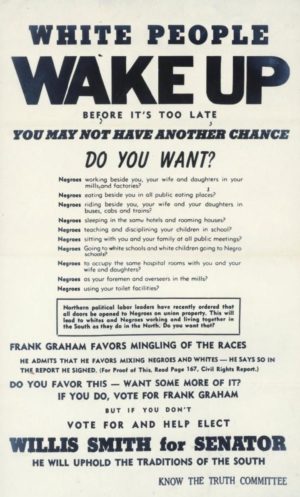 Jun 22: North Carolina Senate race: Race-baiting handbills circulate. Willis Smith, who is running in the North Carolina primary runoff for Sen. Frank Graham’s Senate seat, goes on Raleigh’s WRAL radio — where his unofficial campaign adviser Jesse Helms is news director — for a statewide campaign address. “My most bitter and alarmed critics say that I am injecting the race issue into a campaign,” he protests. “Nothing could be further from the truth. Race feeling was stirred by the 1947 report of (President Truman’s) committee on civil rights, of which Dr. Graham was a member. That committee recommended many things, among them the end of segregation everywhere and the immediate enactment of an FEPC (Fair Employment Practices Commission) law with Federal enforcement. The race issue was tossed into the political field when President Truman sponsored a bill in Congress providing for FEPC. The race issue was fanned by the Negroes themselves when in the last primary they cast a practically solid — a bloc Negro vote — for my opposition.” Smith vows that “our state will not accept Federal job forcing.” Meanwhile, Smith’s surrogates, calling themselves the Know the Truth Committee, are busy distributing handbills asking as series of questions: “Do you want… Negroes working beside you, your wife and daughters in your mills and factories? … eating beside you in all public places? …riding beside you, your wife and your daughters in public busses, cabs and trains? …to occupy the same hospital rooms with you and your wife and daughters? …as your foremen and overseers in the mills? …using your toilet facilities?” The handbill asserts that “Frank Graham favors mingling of the races” and a vote for Smith “will uphold the traditions of the South.”
Jun 22: North Carolina Senate race: Race-baiting handbills circulate. Willis Smith, who is running in the North Carolina primary runoff for Sen. Frank Graham’s Senate seat, goes on Raleigh’s WRAL radio — where his unofficial campaign adviser Jesse Helms is news director — for a statewide campaign address. “My most bitter and alarmed critics say that I am injecting the race issue into a campaign,” he protests. “Nothing could be further from the truth. Race feeling was stirred by the 1947 report of (President Truman’s) committee on civil rights, of which Dr. Graham was a member. That committee recommended many things, among them the end of segregation everywhere and the immediate enactment of an FEPC (Fair Employment Practices Commission) law with Federal enforcement. The race issue was tossed into the political field when President Truman sponsored a bill in Congress providing for FEPC. The race issue was fanned by the Negroes themselves when in the last primary they cast a practically solid — a bloc Negro vote — for my opposition.” Smith vows that “our state will not accept Federal job forcing.” Meanwhile, Smith’s surrogates, calling themselves the Know the Truth Committee, are busy distributing handbills asking as series of questions: “Do you want… Negroes working beside you, your wife and daughters in your mills and factories? … eating beside you in all public places? …riding beside you, your wife and your daughters in public busses, cabs and trains? …to occupy the same hospital rooms with you and your wife and daughters? …as your foremen and overseers in the mills? …using your toilet facilities?” The handbill asserts that “Frank Graham favors mingling of the races” and a vote for Smith “will uphold the traditions of the South.”![]()
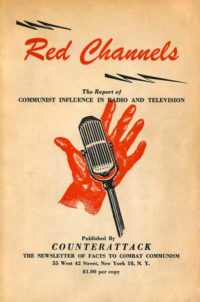 Jun 22: Red Channels, the basis for the Hollywood Blacklist, is published. American Business Consultants issues a booklet titled Red Channels: The Report of Communist Influence in Radio and Television. The ABC, founded in 1947 by several former FBI agents, is an anti-Communist group which one spokesman described as ” a sort of a private FBI.” The booklet lists the names of 151 actors, directors, producers, musicians, and other entertainers and cultural figures who the ABC claims are Communist Party members or sympathizers. Those listed include: Aaron Copland, Leonard Bernstein, Howard Da Silva, José Ferrer, John Garfield, Will Geer, Lillian Hellman, Lena Horne, Langston Hughes, Burl Ives, Gypsy Rose Lee, Philip Loeb, Alan Lomax, Burgess Meredith, Arthur Miller, Zero Mostel, Jean Muir, Dorothy Parker, Edward G. Robinson, Hazel Scott, Pete Seeger, Artie Shaw, William L. Shirer, Lionel Stander, Gale Sondergaard, Orson Welles, Josh White, and Ireene Wicker. Red Channels quickly becomes the basis for the Hollywood blacklist. The impact of Red Channels will be greatly amplified three days later when Communist North Korean troops invade South Korea and the U.S. enters the Korean war.
Jun 22: Red Channels, the basis for the Hollywood Blacklist, is published. American Business Consultants issues a booklet titled Red Channels: The Report of Communist Influence in Radio and Television. The ABC, founded in 1947 by several former FBI agents, is an anti-Communist group which one spokesman described as ” a sort of a private FBI.” The booklet lists the names of 151 actors, directors, producers, musicians, and other entertainers and cultural figures who the ABC claims are Communist Party members or sympathizers. Those listed include: Aaron Copland, Leonard Bernstein, Howard Da Silva, José Ferrer, John Garfield, Will Geer, Lillian Hellman, Lena Horne, Langston Hughes, Burl Ives, Gypsy Rose Lee, Philip Loeb, Alan Lomax, Burgess Meredith, Arthur Miller, Zero Mostel, Jean Muir, Dorothy Parker, Edward G. Robinson, Hazel Scott, Pete Seeger, Artie Shaw, William L. Shirer, Lionel Stander, Gale Sondergaard, Orson Welles, Josh White, and Ireene Wicker. Red Channels quickly becomes the basis for the Hollywood blacklist. The impact of Red Channels will be greatly amplified three days later when Communist North Korean troops invade South Korea and the U.S. enters the Korean war.
▲Friday, June 23
![]() Jun 23: The University of California Board of Regents approves the firing of 157 faculty members who refused to sign a loyalty oath stating that they were not members of the Communist party.
Jun 23: The University of California Board of Regents approves the firing of 157 faculty members who refused to sign a loyalty oath stating that they were not members of the Communist party.
▲Saturday, June 24
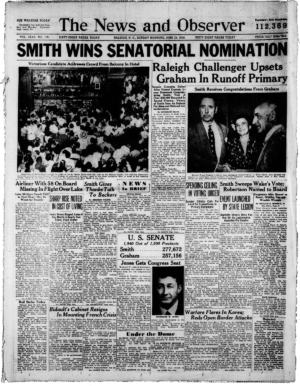 Jun 24: North Carolina Senate race: Segregationist defeats moderate incumbent. Willis Smith pulls off an astounding upset by defeating Sen. Frank Graham in North Carolina’s Democratic primary runoff. Graham had polled almost nine percentage points ahead of Smith in last month’s primary. But Graham failed to get more than half the votes cast, which set the stage for today’s run-off election. In a surprise to the political establishment that backs Graham, Smith wins in a 51.8% to 48.2% vote. Race politics played a heavy role in this election, driven primarily by opposition to “Trumanism” (which, in the South, primarily refers to President Truman’s civil rights policies) and the U.S. Supreme Court decisions earlier this month that threaten segregation’s status quo. White working poor and farmers in the eastern part of the state, who had been the core of Graham’s support just a month ago, has abandoned him over racial issues. The win virtually guarantees that Smith will become the state’s next Senator since the November election is little more than a formality in a state where Republicans, regardless of their policies, are still reviled due to the Civil War and Reconstruction.
Jun 24: North Carolina Senate race: Segregationist defeats moderate incumbent. Willis Smith pulls off an astounding upset by defeating Sen. Frank Graham in North Carolina’s Democratic primary runoff. Graham had polled almost nine percentage points ahead of Smith in last month’s primary. But Graham failed to get more than half the votes cast, which set the stage for today’s run-off election. In a surprise to the political establishment that backs Graham, Smith wins in a 51.8% to 48.2% vote. Race politics played a heavy role in this election, driven primarily by opposition to “Trumanism” (which, in the South, primarily refers to President Truman’s civil rights policies) and the U.S. Supreme Court decisions earlier this month that threaten segregation’s status quo. White working poor and farmers in the eastern part of the state, who had been the core of Graham’s support just a month ago, has abandoned him over racial issues. The win virtually guarantees that Smith will become the state’s next Senator since the November election is little more than a formality in a state where Republicans, regardless of their policies, are still reviled due to the Civil War and Reconstruction.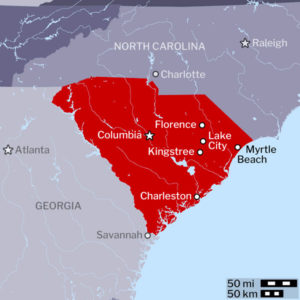 Jun 24: KKK parades through Florence, Lake City, Kingstree. A parade of 47 cars carrying about 150 white-robed Klansmen parade through the city of Florence, South Carolina. The parade forms at the old army airfield and proceeds into town, led by a police car in front while another police car follows at the rear. The parade’s lead car is described as bearing “an electrically lighted red cross approximately four feet high.” The caravan drives through downtown and turns south onto U.S. Route 52, where it proceeds on to Lake City and Kingstree.
Jun 24: KKK parades through Florence, Lake City, Kingstree. A parade of 47 cars carrying about 150 white-robed Klansmen parade through the city of Florence, South Carolina. The parade forms at the old army airfield and proceeds into town, led by a police car in front while another police car follows at the rear. The parade’s lead car is described as bearing “an electrically lighted red cross approximately four feet high.” The caravan drives through downtown and turns south onto U.S. Route 52, where it proceeds on to Lake City and Kingstree.
![]()
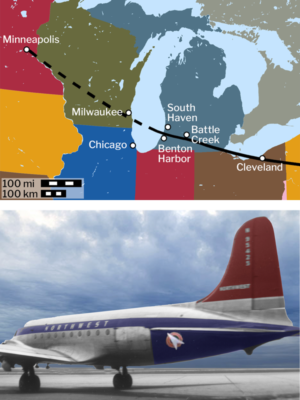 Jun 24: Northwest Orient Airlines flight disappears over Lake Michigan, 58 killed. A Northwest Orient Airlines DC-4 with fifty-eight people on board disappears over Lake Michigan about eighteen miles north-northwest of Benton Harbor, Michigan. The flight is operating its daily transcontinental service between New York LaGuardia and Seattle, with planned stops in Minneapolis and Spokane. Before the flight takes off from LaGaurdia at 8:31 p.m. EST, Capt. Robert Lind requests permission to descend from 6,000 feet to 4,000 feet when he approaches Lake Michigan after receiving reports of thunderstorms over the lake. His request was denied due to other traffic assigned to that altitude. At 10:49 p.m. EST, when over Cleveland, Ohio, Capt. Lind again requested the lower altitude. This time, his request is approved. Forty minutes later, air traffic controllers tell Lind to descend to 3,500 feet because there’s an eastbound flight at 5,000 feet over Lake Michigan experiencing severe turbulence, and controllers want a greater separation between the two flights. At 10:51 Central Time, Lind reports that he is over Battle Creek, Michigan, and should be checking in over Milwaukee at 11:37 CST. At 11:13, while flying over Benton Harbor, Lind requests an altitude of 2,500 feet, but gives no reason for his request. Air traffic controllers deny the request due to other traffic. After the flight fails to make contact with Milwaukee, hundreds of planes and boats in the area conduct an intensive search. Over the next two days, the teams only find scattered debris and body parts. More body parts wash up on shore between Benton Harbor and South Haven, forcing the temporary closure of those beaches. Because the wreckage has never been found, the cause of the accident cannot be determined. It is the worst air disaster in U.S. history to date, and the world’s worst disaster since the March 12 crash in Wales, where eighty were killed.
Jun 24: Northwest Orient Airlines flight disappears over Lake Michigan, 58 killed. A Northwest Orient Airlines DC-4 with fifty-eight people on board disappears over Lake Michigan about eighteen miles north-northwest of Benton Harbor, Michigan. The flight is operating its daily transcontinental service between New York LaGuardia and Seattle, with planned stops in Minneapolis and Spokane. Before the flight takes off from LaGaurdia at 8:31 p.m. EST, Capt. Robert Lind requests permission to descend from 6,000 feet to 4,000 feet when he approaches Lake Michigan after receiving reports of thunderstorms over the lake. His request was denied due to other traffic assigned to that altitude. At 10:49 p.m. EST, when over Cleveland, Ohio, Capt. Lind again requested the lower altitude. This time, his request is approved. Forty minutes later, air traffic controllers tell Lind to descend to 3,500 feet because there’s an eastbound flight at 5,000 feet over Lake Michigan experiencing severe turbulence, and controllers want a greater separation between the two flights. At 10:51 Central Time, Lind reports that he is over Battle Creek, Michigan, and should be checking in over Milwaukee at 11:37 CST. At 11:13, while flying over Benton Harbor, Lind requests an altitude of 2,500 feet, but gives no reason for his request. Air traffic controllers deny the request due to other traffic. After the flight fails to make contact with Milwaukee, hundreds of planes and boats in the area conduct an intensive search. Over the next two days, the teams only find scattered debris and body parts. More body parts wash up on shore between Benton Harbor and South Haven, forcing the temporary closure of those beaches. Because the wreckage has never been found, the cause of the accident cannot be determined. It is the worst air disaster in U.S. history to date, and the world’s worst disaster since the March 12 crash in Wales, where eighty were killed.
▲Sunday, June 25
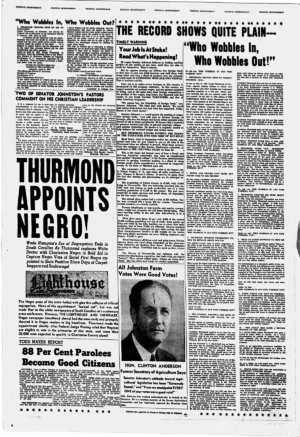 Jun 25: South Carolina Senate race: Strom Thurmond accused of appointing black doctor to hospital board. South Carolina’s all-important Democratic primary campaign is entering its final two weeks. The most closely-watched race is that between Gov. Strom Thurmond and Sen. Olin Johnston for Johnston’s Senate seat. In the days following the resumption of the South Carolina Democratic party’s county-to-county “speakings” last week, their encounters have become much more acrimonious. Each as been trying to paint the other as soft on segregation, a very difficult task given both of their well-established records. At one point last week Thurmond declared that the NAACP and the CIO are working to break down racial segregation in the south by supporting Johnston. Johnston vehemently shouted that “any man that says I am for mixing of the races is an unmitigated liar … a low down contemptible liar … I’m getting tired of some of this.” Johnston, who has insisted that he is running a polite “Christian” campaign, contines: “I don’t have to go about talking about somebody else and talk about all the mean and nasty things I can drag up.” Then he adds that “some day there might be a break in the situation and some of you know about Olin Johnston and how I will rave when I cut loose.” That blast arrives today with full-page ads in the state’s leading newspapers. Johnston’s adds accuse Thurmond of “replac(ing) a White Doctor with Charleston Negro in Bold Bid to Capture Negro Vote of State! First Negro appointed to State Positions Since Days of Carpetbaggers and Scalawags!”
Jun 25: South Carolina Senate race: Strom Thurmond accused of appointing black doctor to hospital board. South Carolina’s all-important Democratic primary campaign is entering its final two weeks. The most closely-watched race is that between Gov. Strom Thurmond and Sen. Olin Johnston for Johnston’s Senate seat. In the days following the resumption of the South Carolina Democratic party’s county-to-county “speakings” last week, their encounters have become much more acrimonious. Each as been trying to paint the other as soft on segregation, a very difficult task given both of their well-established records. At one point last week Thurmond declared that the NAACP and the CIO are working to break down racial segregation in the south by supporting Johnston. Johnston vehemently shouted that “any man that says I am for mixing of the races is an unmitigated liar … a low down contemptible liar … I’m getting tired of some of this.” Johnston, who has insisted that he is running a polite “Christian” campaign, contines: “I don’t have to go about talking about somebody else and talk about all the mean and nasty things I can drag up.” Then he adds that “some day there might be a break in the situation and some of you know about Olin Johnston and how I will rave when I cut loose.” That blast arrives today with full-page ads in the state’s leading newspapers. Johnston’s adds accuse Thurmond of “replac(ing) a White Doctor with Charleston Negro in Bold Bid to Capture Negro Vote of State! First Negro appointed to State Positions Since Days of Carpetbaggers and Scalawags!”![]()
 Jun 25: North Korea launches multiple attacks across the 38th Parallel. At 4:00 a.m. local time, North Korean artillery and mortars break the silence along the 38th Parallel on the Onjin (Ongjin) Peninsula. A half-hour later, ground troops begin sweeping through. Within the hour, North Korean enter the ancient capital city of Kaesong, located just two miles below the Parallel on Korea’s main north-south highway and rail line. The city is entirely in the Norths’ hands by 9:30. At about the same time, more tank divisions drive south on the two roads converging at Uijongbu (Uijeongbu) on the ancient invasion route to Seoul. This is the main body of the North’s invasion force. Further to the east, an invasion force tries to take Chunchon (Chuncheon), but they are held in check by South Korean forces. On the east coast, a North Korean division begins moving down the coastal highway, while guerrilla units land in three locations near Kangnung (Gangneung) and Samchok (Samcheouk). At 11:00 a.m., Pyongyang radio says the Democratic People’s Republic of Korea has declared war on South Korea as a result of a claimed invasion at Haiju by “puppet forces” of South Korea’s president, “the bandit traitor Syngman Rhee.” Altogether, six North Korean infantry divisions, an armored brigade and three border brigades have crossed 38th Parallel. The North’s Korean People’s Army (KPA) number between 150,000 and 200,000 troops, organized in ten infantry divisions, one tank division, and one air force division, and well-armed with 210 fighter planes and 280 tanks. South Korea has only about 98,000 soldiers, no tanks, no anti-tank weapons or heavy artillery, and no air force to speak of. Further, the army is caught off guard, with many of its personnel on weekend leave — except for the forces at Chunchon, which are at full strength and the only source of encouragement for the South. In New York, the U.N. Security Council votes 9-0 (with the Soviet Union absent due to a boycott, and Yugoslavia abstaining) to approve a resolution branding North Korea the aggressor and demanding the immediate cease-fire and a withdrawal of its troops. Gen. Douglas MacArthur, Supreme Commander for the Allied Powers in Japan, begins shipping arms and supplies to South Korea while President Truman, on vacation in Missouri, flies back to Washington, DC, for meetings at Blair House.
Jun 25: North Korea launches multiple attacks across the 38th Parallel. At 4:00 a.m. local time, North Korean artillery and mortars break the silence along the 38th Parallel on the Onjin (Ongjin) Peninsula. A half-hour later, ground troops begin sweeping through. Within the hour, North Korean enter the ancient capital city of Kaesong, located just two miles below the Parallel on Korea’s main north-south highway and rail line. The city is entirely in the Norths’ hands by 9:30. At about the same time, more tank divisions drive south on the two roads converging at Uijongbu (Uijeongbu) on the ancient invasion route to Seoul. This is the main body of the North’s invasion force. Further to the east, an invasion force tries to take Chunchon (Chuncheon), but they are held in check by South Korean forces. On the east coast, a North Korean division begins moving down the coastal highway, while guerrilla units land in three locations near Kangnung (Gangneung) and Samchok (Samcheouk). At 11:00 a.m., Pyongyang radio says the Democratic People’s Republic of Korea has declared war on South Korea as a result of a claimed invasion at Haiju by “puppet forces” of South Korea’s president, “the bandit traitor Syngman Rhee.” Altogether, six North Korean infantry divisions, an armored brigade and three border brigades have crossed 38th Parallel. The North’s Korean People’s Army (KPA) number between 150,000 and 200,000 troops, organized in ten infantry divisions, one tank division, and one air force division, and well-armed with 210 fighter planes and 280 tanks. South Korea has only about 98,000 soldiers, no tanks, no anti-tank weapons or heavy artillery, and no air force to speak of. Further, the army is caught off guard, with many of its personnel on weekend leave — except for the forces at Chunchon, which are at full strength and the only source of encouragement for the South. In New York, the U.N. Security Council votes 9-0 (with the Soviet Union absent due to a boycott, and Yugoslavia abstaining) to approve a resolution branding North Korea the aggressor and demanding the immediate cease-fire and a withdrawal of its troops. Gen. Douglas MacArthur, Supreme Commander for the Allied Powers in Japan, begins shipping arms and supplies to South Korea while President Truman, on vacation in Missouri, flies back to Washington, DC, for meetings at Blair House.
![]() Jun 25: Switchmen’s union launches strike against five railroads. Four thousand members of the Switchmen’s Union of North America go on strike against five Midwestern and Western railroads. The strikers demand a reduction of their work week from 48-hours to 40 hours, with no loss in pay. Railroad owners complain that this amounts to a 20% pay raise, or the equivalent of 31¢ an hour (about $3.35 today). The switchmen — they operate the manual switches in the rail yards — walk off the job at 6:00 a.m. local time. All through passenger and freight trains on four of the railroads come to a halt. The railroads affected are the Chicago, Rock Island and Pacific; the Chicago Great Western; the Denver and Rio Grande Western; and Western Pacific. The fifth railroad, the Great Northern, is little affected since only 600 of its 15,000 switchmen are SUNA members.
Jun 25: Switchmen’s union launches strike against five railroads. Four thousand members of the Switchmen’s Union of North America go on strike against five Midwestern and Western railroads. The strikers demand a reduction of their work week from 48-hours to 40 hours, with no loss in pay. Railroad owners complain that this amounts to a 20% pay raise, or the equivalent of 31¢ an hour (about $3.35 today). The switchmen — they operate the manual switches in the rail yards — walk off the job at 6:00 a.m. local time. All through passenger and freight trains on four of the railroads come to a halt. The railroads affected are the Chicago, Rock Island and Pacific; the Chicago Great Western; the Denver and Rio Grande Western; and Western Pacific. The fifth railroad, the Great Northern, is little affected since only 600 of its 15,000 switchmen are SUNA members.
▲Monday, June 26
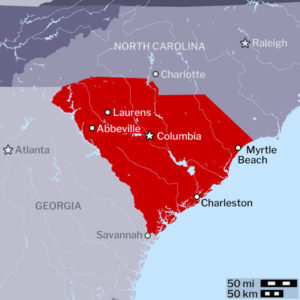 Jun 26: South Carolina Senate race: Strom Thurmond condemns Sen. Olin Johnston for “stirring the fires of racial prejudice.” The South Carolina Democratic Party’s county-to-county “speakings” move today to Laurens and Abbeville, which has seen Ku Klux Klan activity recently. Sen. Olin D. Johnston and his challenger, Gov Strom Thurnond meet for the first time since Johnston’s full-page ad against Thurmond appeared in the state’s major Sunday papers. At one point during Thurmond’s speech today, Johnston shouts at him, “You are a liar!” Thurmond answers by offering to meet the Senator in front of the Court House when this meeting is over. Later, when Thurmond accuses Johnston of demagoguery, Johnston says that Thurmond “was talking to a crowd that already knew me,” provoking laughter and applause. Johnston then adds, “I’ve been trying to run this campaign on a high, Christian basis. I’ve taken (Thurmond’s charges) good-natured.” But now, Johnston has new ammunition, which he previewed in Sunday’s newspaper ads. He holds up a copy of the Lighthouse and Informer, an Africa-American newspaper published in Columbia, with the headline reading “Thurmond Appoints First Negro.” The article is about the appointment of Dr. T.C. McFall, of Charleston, to the South Carolina Advisory Hospital Council. Thurmond condemns Johnston for “stir(ing) the fires of racial prejudice,” and defends the appointment by pointing out that he was merely following the law by following the recommendation of the State Medical Association. “My opponent’s attack is upon the doctors of the state, and not me as governor,” says Thurmond. Johnston replies, “Recommendation or no recommendation, I would have suffered my right arm to be severed before I would sign such a commission.” Johnston also brags that he has “blocked every one” of Truman’s civil rights bills — the Fair Employment Practices Commission bill, anti-poll tax bills, and an anti-lynching bill.
Jun 26: South Carolina Senate race: Strom Thurmond condemns Sen. Olin Johnston for “stirring the fires of racial prejudice.” The South Carolina Democratic Party’s county-to-county “speakings” move today to Laurens and Abbeville, which has seen Ku Klux Klan activity recently. Sen. Olin D. Johnston and his challenger, Gov Strom Thurnond meet for the first time since Johnston’s full-page ad against Thurmond appeared in the state’s major Sunday papers. At one point during Thurmond’s speech today, Johnston shouts at him, “You are a liar!” Thurmond answers by offering to meet the Senator in front of the Court House when this meeting is over. Later, when Thurmond accuses Johnston of demagoguery, Johnston says that Thurmond “was talking to a crowd that already knew me,” provoking laughter and applause. Johnston then adds, “I’ve been trying to run this campaign on a high, Christian basis. I’ve taken (Thurmond’s charges) good-natured.” But now, Johnston has new ammunition, which he previewed in Sunday’s newspaper ads. He holds up a copy of the Lighthouse and Informer, an Africa-American newspaper published in Columbia, with the headline reading “Thurmond Appoints First Negro.” The article is about the appointment of Dr. T.C. McFall, of Charleston, to the South Carolina Advisory Hospital Council. Thurmond condemns Johnston for “stir(ing) the fires of racial prejudice,” and defends the appointment by pointing out that he was merely following the law by following the recommendation of the State Medical Association. “My opponent’s attack is upon the doctors of the state, and not me as governor,” says Thurmond. Johnston replies, “Recommendation or no recommendation, I would have suffered my right arm to be severed before I would sign such a commission.” Johnston also brags that he has “blocked every one” of Truman’s civil rights bills — the Fair Employment Practices Commission bill, anti-poll tax bills, and an anti-lynching bill.▲Tuesday, June 27
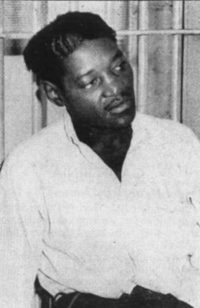 Jun 27: Scottsboro Boys fugutive arrested. Haywood Patterson, a principle figure in the “Scottsboro Boys” trials, is arrested in Detroit, two years after he escaped from an Alabama prison. He was serving a 75-year sentence for allegedly raping two white women on a train in 1931. Patterson fled to New York, and with writer Earl Conrad, wrote Scottsboro Boy, which was released last April. Patterson has lived mainly on the $4,700 advance (about $50,000 today) from Doubleday. He recently moved to Detroit, where his sister lives, to take a construction job. FBI agents arrest him on a fugitive warrant charging unlawful flight as he steps off a city bus near his home. In Scottsboro Boy, Patterson described his arrest, trial, and harrowing experiences as an African-American man in an Alabama prison. His account included names of sadistic guards, wardens, and other prison officials, making his extradition back to Alabama an almost certain death sentence. He will be released on bond on June 30.
Jun 27: Scottsboro Boys fugutive arrested. Haywood Patterson, a principle figure in the “Scottsboro Boys” trials, is arrested in Detroit, two years after he escaped from an Alabama prison. He was serving a 75-year sentence for allegedly raping two white women on a train in 1931. Patterson fled to New York, and with writer Earl Conrad, wrote Scottsboro Boy, which was released last April. Patterson has lived mainly on the $4,700 advance (about $50,000 today) from Doubleday. He recently moved to Detroit, where his sister lives, to take a construction job. FBI agents arrest him on a fugitive warrant charging unlawful flight as he steps off a city bus near his home. In Scottsboro Boy, Patterson described his arrest, trial, and harrowing experiences as an African-American man in an Alabama prison. His account included names of sadistic guards, wardens, and other prison officials, making his extradition back to Alabama an almost certain death sentence. He will be released on bond on June 30.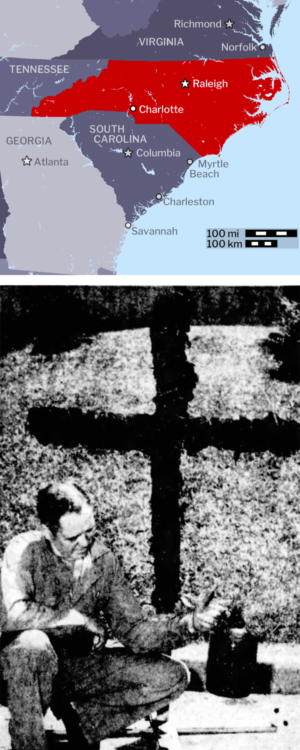 Jun 27: Cross burned in back yard of a Charlotte home. Police in Charlotte, North Carolina, investigate the burning of a five-foot cross in the back yard of an Oakwood Avenue home. The cross is lit shortly after 11:00 p.m. Two teenaged boys sitting in a car parked nearby tell police they saw a man dressed in overalls jump the picket fence around Helen Ratcliff’s yard as the cross burst into flames. They say the man ran across Anderson street and into the woods at a school playground. At the same time, a cab driver says he saw a man run out of the school playground and jump into either an Oldsmobile or a Cadillac already occupied by two men, and the car sped off. The five-foot cross was wrapped in kerosene-soaked rags. Police find a gallon jug containing about a quart of kerosene. Mrs. Ratcliff, who is white and divorced, says she has never been threatened and doesn’t know why the cross was burned in her yard. Charlotte Police Chief Frank Littlejohn says he doesn’t think the Klan is responsible. In January, Littlejohn deflected blame away from the Klan after an African-American family’s home was bombed. Another cross will be burned in Ratcliff’s front yard two months later.
Jun 27: Cross burned in back yard of a Charlotte home. Police in Charlotte, North Carolina, investigate the burning of a five-foot cross in the back yard of an Oakwood Avenue home. The cross is lit shortly after 11:00 p.m. Two teenaged boys sitting in a car parked nearby tell police they saw a man dressed in overalls jump the picket fence around Helen Ratcliff’s yard as the cross burst into flames. They say the man ran across Anderson street and into the woods at a school playground. At the same time, a cab driver says he saw a man run out of the school playground and jump into either an Oldsmobile or a Cadillac already occupied by two men, and the car sped off. The five-foot cross was wrapped in kerosene-soaked rags. Police find a gallon jug containing about a quart of kerosene. Mrs. Ratcliff, who is white and divorced, says she has never been threatened and doesn’t know why the cross was burned in her yard. Charlotte Police Chief Frank Littlejohn says he doesn’t think the Klan is responsible. In January, Littlejohn deflected blame away from the Klan after an African-American family’s home was bombed. Another cross will be burned in Ratcliff’s front yard two months later.
![]()
 Jun 27: Korean War: Uijongbu falls to the Communists, South Korean government moves to Taejon. Seoul’s residents awaken to discover Uijongbu (Uijeongbu) has fallen to the North Koreans the day before and that the South Korean government has fled to Taejon (Daejeon). With Uijongbui’s fall, the Republic of Korea (ROK) forces holding off a Korean People’s Army (KPA) advance along a line betwen Munsan-ni and Korangpo-ri are threatened with encirclement. They quickly abandon their positions in a disorganized retreat. This means that there is now little to keep the KPA from entering the Seoul. At mid-afternoon, one KPA tank suddenly appears at the ancient Changdok (Changdeokgung) Palace. It is quickly destroyed and the KPA pulls back out of Seoul for the time being. Nevertheless, panic spreads across the city, and fleeing refugees clog roads and bridges crossing the Han river to the south. The U.S. evacuates American citizens and other foreign nationals to Kimpo and Suwan Airfields, both of which are under the protection of U.S. Air Force fighters based in Japan. American fighters shoot down three North Korean planes near Inchon and four more YAK-3 fighters over Kimpo Field. That evening, KPA tanks reenter Seoul’s northern suburbs. On the east coast at Kangnung (Gangneon), ROK forces begin an orderly withdrawal westwards into the mountains. But at Chunchon (Chuncheon), ROK forces hold firm against the Reds on the roads north and east of the city.
Jun 27: Korean War: Uijongbu falls to the Communists, South Korean government moves to Taejon. Seoul’s residents awaken to discover Uijongbu (Uijeongbu) has fallen to the North Koreans the day before and that the South Korean government has fled to Taejon (Daejeon). With Uijongbui’s fall, the Republic of Korea (ROK) forces holding off a Korean People’s Army (KPA) advance along a line betwen Munsan-ni and Korangpo-ri are threatened with encirclement. They quickly abandon their positions in a disorganized retreat. This means that there is now little to keep the KPA from entering the Seoul. At mid-afternoon, one KPA tank suddenly appears at the ancient Changdok (Changdeokgung) Palace. It is quickly destroyed and the KPA pulls back out of Seoul for the time being. Nevertheless, panic spreads across the city, and fleeing refugees clog roads and bridges crossing the Han river to the south. The U.S. evacuates American citizens and other foreign nationals to Kimpo and Suwan Airfields, both of which are under the protection of U.S. Air Force fighters based in Japan. American fighters shoot down three North Korean planes near Inchon and four more YAK-3 fighters over Kimpo Field. That evening, KPA tanks reenter Seoul’s northern suburbs. On the east coast at Kangnung (Gangneon), ROK forces begin an orderly withdrawal westwards into the mountains. But at Chunchon (Chuncheon), ROK forces hold firm against the Reds on the roads north and east of the city.
![]() Jun 27: U.N. Security Council calls on members to help South Korea. The United Nations Security Council approves Resolution 83, which calls on North Korea to withdraw immediately back to the 38th Parallel and urges “the Members of the United Nations furnish such assistance to the Republic of Korea as may be necessary to repel the armed attack.” Because the Soviet Union has been boycotting the Security Council since January, its representative is absent for this vote and is unable to issue a veto.
Jun 27: U.N. Security Council calls on members to help South Korea. The United Nations Security Council approves Resolution 83, which calls on North Korea to withdraw immediately back to the 38th Parallel and urges “the Members of the United Nations furnish such assistance to the Republic of Korea as may be necessary to repel the armed attack.” Because the Soviet Union has been boycotting the Security Council since January, its representative is absent for this vote and is unable to issue a veto.
![]() Jun 27: Truman orders American forces to aid South Korea. President Truman orders American forces to aid in the defense of South Korea, and places the Seventh Fleet under the command of Gen. Douglas MacArthur, Supreme Commander for the Allied Powers in Japan. He also orders the U.S. 7th Fleet to Taiwan, to forestall any attempt by Communist China to invade the island on fears that the war in Korea may be a prelude to a wider war in Asia. Despite Truman’s orders, U.S. aid will be very slow to arrive in Korea. Longstanding American sentiment against maintaining a large standing peacetime army means that the country had done exactly as it has always done following previous wars: it has slashed the military’s size to a bare minimum. Almost all of it, except for a small occupation force in Japan, is many thousands of miles away in the U.S. and Western Europe. Much of the military’s equipment, which was no longer needed at the conclusion of the war in Europe and Japan, has been sold off or scrapped. What remains hasn’t been well maintained, and is located thousands of miles away from where the fighting has broken out. The effort to get that material and personnel to Korea will strain the military’s logistical capabilities to the breaking point. To make matters worse, Defense Department policy has shifted toward a heavy reliance on its nascent nuclear arsenal to deter Soviet aggression in Europe, a policy that has overlooked the needs of fighting a conventional war elsewhere. It will take months before even the most basic supplies — ammunition, rations, spare parts, fuel, batteries to power mobile radios — can be manufactured and shipped, let alone more complex items like tanks, heavy artillery, and aircraft, now that much of the country’s wartime manufacturing capabilities have reverted to peacetime production.
Jun 27: Truman orders American forces to aid South Korea. President Truman orders American forces to aid in the defense of South Korea, and places the Seventh Fleet under the command of Gen. Douglas MacArthur, Supreme Commander for the Allied Powers in Japan. He also orders the U.S. 7th Fleet to Taiwan, to forestall any attempt by Communist China to invade the island on fears that the war in Korea may be a prelude to a wider war in Asia. Despite Truman’s orders, U.S. aid will be very slow to arrive in Korea. Longstanding American sentiment against maintaining a large standing peacetime army means that the country had done exactly as it has always done following previous wars: it has slashed the military’s size to a bare minimum. Almost all of it, except for a small occupation force in Japan, is many thousands of miles away in the U.S. and Western Europe. Much of the military’s equipment, which was no longer needed at the conclusion of the war in Europe and Japan, has been sold off or scrapped. What remains hasn’t been well maintained, and is located thousands of miles away from where the fighting has broken out. The effort to get that material and personnel to Korea will strain the military’s logistical capabilities to the breaking point. To make matters worse, Defense Department policy has shifted toward a heavy reliance on its nascent nuclear arsenal to deter Soviet aggression in Europe, a policy that has overlooked the needs of fighting a conventional war elsewhere. It will take months before even the most basic supplies — ammunition, rations, spare parts, fuel, batteries to power mobile radios — can be manufactured and shipped, let alone more complex items like tanks, heavy artillery, and aircraft, now that much of the country’s wartime manufacturing capabilities have reverted to peacetime production.
▲Wednesday, June 28
![]()
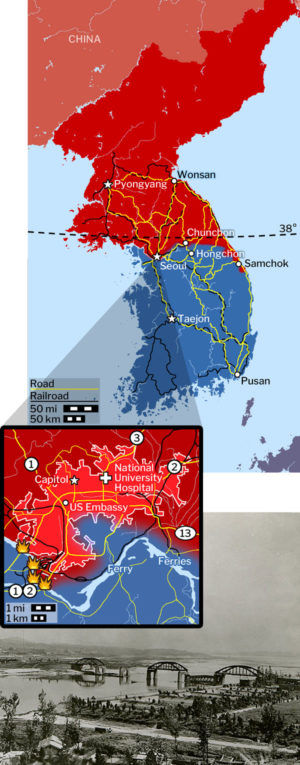 Jun 28: Korean War: Seoul is abandoned to North Korean invaders. Republic of Korea (ROK) forces in Seoul have standing orders to blow up the Han River bridges south of the city the moment enemy tanks show up in central Seoul. But at about 2:15 a.m., with Koran People’s Army (KPA) forces still on the far northern fringes of the city, the ROK prematurely blows up the bridges with no warning to the military and civilian crowds on the spans. The disaster goes far beyond the estimated 500 to 800 people killed that night on the spans. Had the ROK followed the plan, they would have had six to eight hours to evacuate most of three divisions and much of their vehicles, equipment and heavy weapons across the Han. Over the next several days, small groups of ROK soldiers will wade across the river or cross in rickety wooden ferries, small boats and makeshift rafts. Of the 98,000 men in the ROK Army, at least 44,000 are killed, captured, or missing. KPA forces finally enter central Seoul at about noon. They storm the National University Hospital and massacre about 900 doctors, nurses, inpatient civilians and wounded soldiers. Several members of the ROK National Assembly are still in Seoul. Forty-eight of them will pledge allegiance to Pyongyang. In Chunchon (Chuncheon), ROK defenders are ordered to withdraw southward to Hongchon (Hongcheon) now that the front has collapsed to the east and west. Once the KPA takes Chunchon, they divide their forces in two: one takes the road southwest to Seoul, and the other continues its drive toward Hongchon.
Jun 28: Korean War: Seoul is abandoned to North Korean invaders. Republic of Korea (ROK) forces in Seoul have standing orders to blow up the Han River bridges south of the city the moment enemy tanks show up in central Seoul. But at about 2:15 a.m., with Koran People’s Army (KPA) forces still on the far northern fringes of the city, the ROK prematurely blows up the bridges with no warning to the military and civilian crowds on the spans. The disaster goes far beyond the estimated 500 to 800 people killed that night on the spans. Had the ROK followed the plan, they would have had six to eight hours to evacuate most of three divisions and much of their vehicles, equipment and heavy weapons across the Han. Over the next several days, small groups of ROK soldiers will wade across the river or cross in rickety wooden ferries, small boats and makeshift rafts. Of the 98,000 men in the ROK Army, at least 44,000 are killed, captured, or missing. KPA forces finally enter central Seoul at about noon. They storm the National University Hospital and massacre about 900 doctors, nurses, inpatient civilians and wounded soldiers. Several members of the ROK National Assembly are still in Seoul. Forty-eight of them will pledge allegiance to Pyongyang. In Chunchon (Chuncheon), ROK defenders are ordered to withdraw southward to Hongchon (Hongcheon) now that the front has collapsed to the east and west. Once the KPA takes Chunchon, they divide their forces in two: one takes the road southwest to Seoul, and the other continues its drive toward Hongchon.
▲Thursday, June 29
![]()
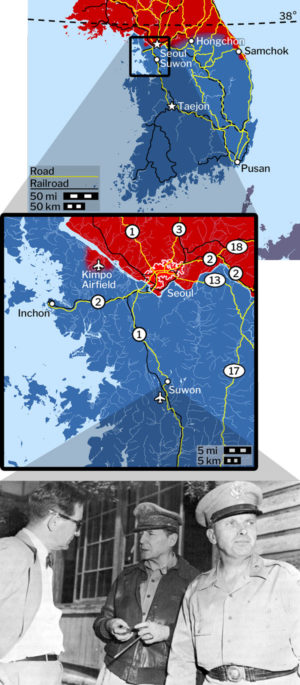 Jun 29: Korean War: MacArthur flies to Korea to personally assess the situation. Gen. Douglas MacArthur, commander of American forces in the Far East, flies from Japan to Korea “to see for myself” the war situation on the ground. Four top staff officers and four reporters accompany MacArthur in his personal C-54 transport Bataan. He arrives in Suwon under U.S. fighter escort, just hours after North Korean fighter planes strafed the airfiend and destroyed a C-54 at the end of the runway. He meets with Republic of Korea President Syngman Rhee, U.S. Ambassador John J. Muccio and other top U.S. officers to get a briefing on the decimated ROK forces at Seoul. He then travels up the road to the Han River across from Seoul to evaluate the situation. On the road to and from the Han, he sees thousands of refugees and disorganized ROK soldiers moving south. What he sees convinces him that unless U.S. troops are deployed immediately, South Korea won’t be able to fend off the invaders themselves.
Jun 29: Korean War: MacArthur flies to Korea to personally assess the situation. Gen. Douglas MacArthur, commander of American forces in the Far East, flies from Japan to Korea “to see for myself” the war situation on the ground. Four top staff officers and four reporters accompany MacArthur in his personal C-54 transport Bataan. He arrives in Suwon under U.S. fighter escort, just hours after North Korean fighter planes strafed the airfiend and destroyed a C-54 at the end of the runway. He meets with Republic of Korea President Syngman Rhee, U.S. Ambassador John J. Muccio and other top U.S. officers to get a briefing on the decimated ROK forces at Seoul. He then travels up the road to the Han River across from Seoul to evaluate the situation. On the road to and from the Han, he sees thousands of refugees and disorganized ROK soldiers moving south. What he sees convinces him that unless U.S. troops are deployed immediately, South Korea won’t be able to fend off the invaders themselves.
![]() Jun 29: Truman: Korean conflict is “a police action.” President Truman tells reporters that the United States is “not at war.” Truman asserts that American combat operations in Korea constitute “a police action” on behalf of the United Nations against an unlawful “bandit.”
Jun 29: Truman: Korean conflict is “a police action.” President Truman tells reporters that the United States is “not at war.” Truman asserts that American combat operations in Korea constitute “a police action” on behalf of the United Nations against an unlawful “bandit.”
![]()
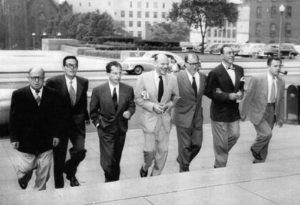 Jun 29: Last eight of Hollywood Ten convicted, sentenced. The last eight of the Hollywood Ten are convicted of contempt of Congress, for refusing to say whether they were Communists when questioned by the House Un-American Activities Committee in 1947. Convicted are writers Albert Maltz (This Gun For Hire, Pride of the Marines), Samuel Ornitz (Imitation of Life), Alvah Bessie (Objective Burma), Ring Lardner Jr. (Woman of the Year, Laura, and later, M*A*S*H), and Lester Cole (The House of the Seven Gables); writer-producer Adrian Scott (Murder My Sweet, Cornered, Crossfire), writer-director Herbert Biberman (New Orleans), and director Edward Dmytryk (Murder My Sweet, Cornered, Back to Bataan). Maltz, Cole, Lardner and Bessie are sentenced to one year in federal prison and fined $1,000 (about $11,000 today). Dmytryk and Biberman are sentenced to six months and fined $1,000. Ortnitz who is recovering from miner surgery, will be sentenced the next day to one year and fined $1,000. Scott, who is ill, will be sentenced to a year in prison and fined in September. Ring Lardner makes a brief statement: “There is only a minor difference of degree between forcing a man to say what his opinions are and dictating what those opinions should be. Whenever men had been compelled to open their minds to government authority, men’s minds have ceased to be free.”
Jun 29: Last eight of Hollywood Ten convicted, sentenced. The last eight of the Hollywood Ten are convicted of contempt of Congress, for refusing to say whether they were Communists when questioned by the House Un-American Activities Committee in 1947. Convicted are writers Albert Maltz (This Gun For Hire, Pride of the Marines), Samuel Ornitz (Imitation of Life), Alvah Bessie (Objective Burma), Ring Lardner Jr. (Woman of the Year, Laura, and later, M*A*S*H), and Lester Cole (The House of the Seven Gables); writer-producer Adrian Scott (Murder My Sweet, Cornered, Crossfire), writer-director Herbert Biberman (New Orleans), and director Edward Dmytryk (Murder My Sweet, Cornered, Back to Bataan). Maltz, Cole, Lardner and Bessie are sentenced to one year in federal prison and fined $1,000 (about $11,000 today). Dmytryk and Biberman are sentenced to six months and fined $1,000. Ortnitz who is recovering from miner surgery, will be sentenced the next day to one year and fined $1,000. Scott, who is ill, will be sentenced to a year in prison and fined in September. Ring Lardner makes a brief statement: “There is only a minor difference of degree between forcing a man to say what his opinions are and dictating what those opinions should be. Whenever men had been compelled to open their minds to government authority, men’s minds have ceased to be free.”
![]() Jun 29: Layoffs spread as railroad strike continues. Layoffs ascribed to the five-day-old strike by 4,000 members of the Switchmen’s Union of North America against five Midwestern and Western railroads have risen to almost 50,000 railroad workers. The Great Northern, which was little-affected when the strike was first called, is now seeing its entire freight operations bottled up. Company officials say that if the strike isn’t resolved by tomorrow, they will lay off four-fifths of their 28,000-member workforce. The other companies targeted by the strike are the Chicago, Rock Island and Pacific; the Chicago and Great Western; the Denver and Rio Grande Western; and Western Pacific. This strike has also idled 5,000 Utah coal miners and 1,000 Utah smelter workers.
Jun 29: Layoffs spread as railroad strike continues. Layoffs ascribed to the five-day-old strike by 4,000 members of the Switchmen’s Union of North America against five Midwestern and Western railroads have risen to almost 50,000 railroad workers. The Great Northern, which was little-affected when the strike was first called, is now seeing its entire freight operations bottled up. Company officials say that if the strike isn’t resolved by tomorrow, they will lay off four-fifths of their 28,000-member workforce. The other companies targeted by the strike are the Chicago, Rock Island and Pacific; the Chicago and Great Western; the Denver and Rio Grande Western; and Western Pacific. This strike has also idled 5,000 Utah coal miners and 1,000 Utah smelter workers.
▲Friday, June 30
![]()
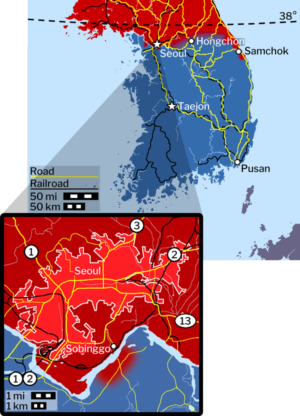 Jun 30: Korean War: North Korean army crosses Han River at Seoul. The North’s Korean People’s Army crosses the Han River from Seoul at the Sobinggo (Seobinggo) ferry crossing. Due to the bridges crossing the Han being blown out three days earlier, the KPA are forced to cross in a few wooden boats capable of carrying, with difficulty, a 2½-ton truck or twenty to thirty soldiers. Most soldiers wind up crossing by wading or swimming. The crossing occurs under the cover of heavy artillery and tank fire from the north bank. The tanks themselves are too heavy to cross, so the KPA’s effectiveness in engaging the remnants of the South Korean army will be severely limited for the next few days until the KPA is able to sufficiently repair one of the bridges. Other KPA forces remain in Seoul searching the city for South Korean soldiers, police, and other “national traitors.” Most are summarily executed, although some are afforded a quick street-corner show trial before they’re shot.
Jun 30: Korean War: North Korean army crosses Han River at Seoul. The North’s Korean People’s Army crosses the Han River from Seoul at the Sobinggo (Seobinggo) ferry crossing. Due to the bridges crossing the Han being blown out three days earlier, the KPA are forced to cross in a few wooden boats capable of carrying, with difficulty, a 2½-ton truck or twenty to thirty soldiers. Most soldiers wind up crossing by wading or swimming. The crossing occurs under the cover of heavy artillery and tank fire from the north bank. The tanks themselves are too heavy to cross, so the KPA’s effectiveness in engaging the remnants of the South Korean army will be severely limited for the next few days until the KPA is able to sufficiently repair one of the bridges. Other KPA forces remain in Seoul searching the city for South Korean soldiers, police, and other “national traitors.” Most are summarily executed, although some are afforded a quick street-corner show trial before they’re shot.
![[Emphasis Mine]](http://jimburroway.com/wp-content/uploads/2018/01/quiltmall.jpg)
